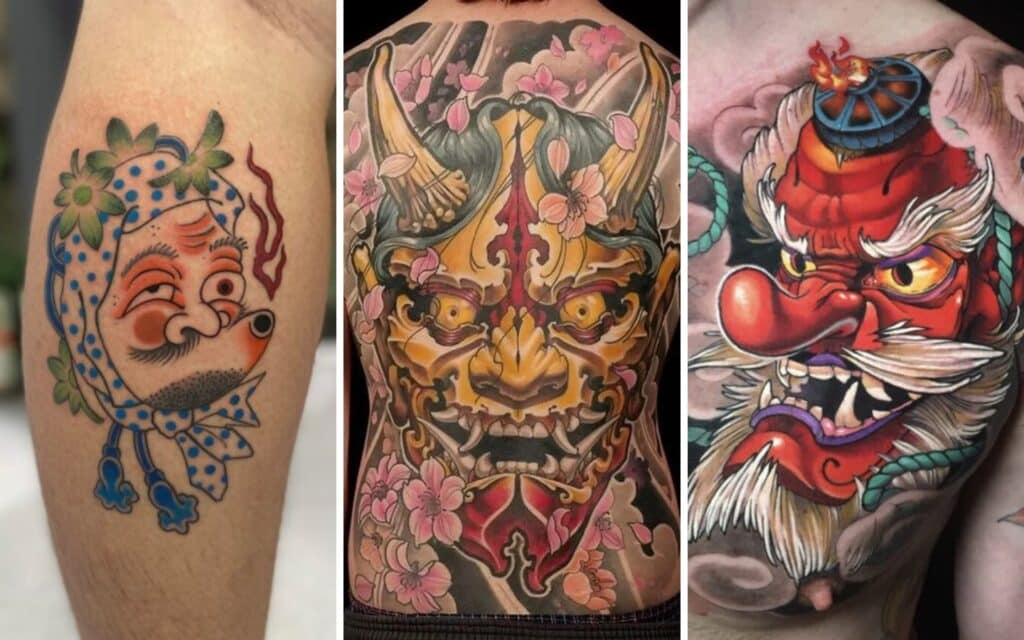Have you ever wondered about the deep symbolism behind Japanese mask tattoos? What do these masks represent, and why are they so adored in tattoo culture?
If you’re interested in Japanese masks and, more specifically, in getting a Tattoo of one and are looking for inspiration and knowledge, then you’re in the right place. Let’s take a look at some of the best Japanese Mask Tattoos we could find.
Japanese Mask History
Japanese masks are steeped in ritual, theater, and cultural symbolism, tracing back to the Noh and Kabuki theatrical performances and religious ceremonies.
These masks represent a variety of characters, deities, and spirits from Japanese folklore, each carrying its own unique story and emotional expression.
In recent years, Japanese culture has surged globally, thanks in large part to the explosive popularity of Japanese anime and video games.
Anime and video games have introduced people from around the world to Japanese myths, legends, and aesthetics.
And It's no surprise that many people are drawn to Japanese masks, seeing as they have appeared in popular anime series such as Demon Slayer Kimetsu no Yaiba’s Hotaru Haganezuka to One Piece’s Kikunojo or in video games from Ghost of Tshushima’s Jin Sakai, to Overwatch’s Genji.
What Are Japanese Masks Used For?
So, what exactly are Japanese masks used for?
Japanese masks first emerged for use in religious ceremonies and rituals, acting as a bridge between the physical and spiritual worlds.
They were believed to possess the power to ward off evil spirits, bring good fortune, and communicate with deities. As such, masks became integral to various Shinto and Buddhist practices.
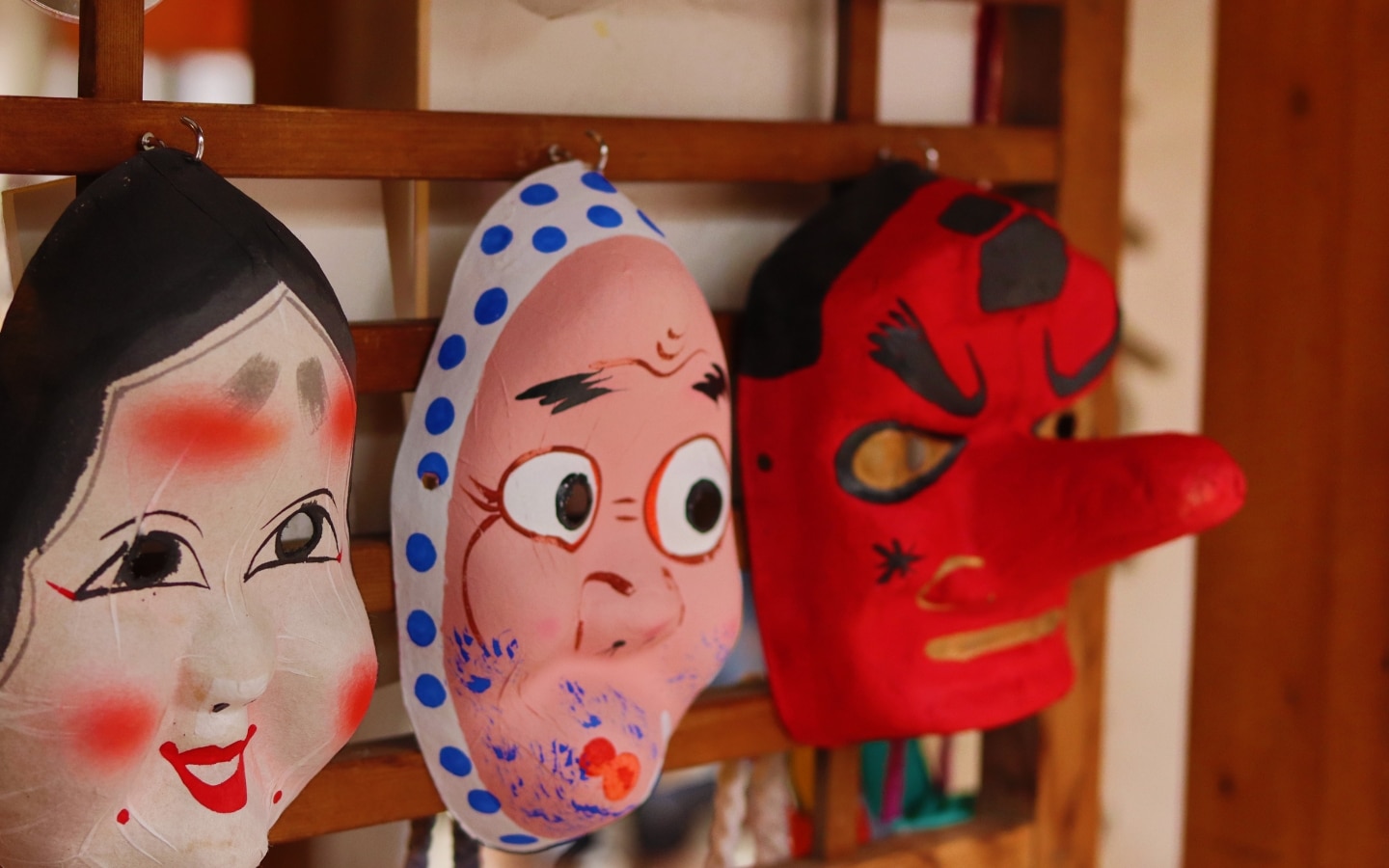
As Japanese society moved on from its superstitious roots, masks found a new stage in the performing arts, most notably in Noh and Kabuki theater.
These theaters utilized masks to convey the characters' identities, emotions, and social statuses.
The masks' designs and expressions allowed performers to embody their roles with a heightened sense of mystique and emotion.
Types of Japanese Mask Tattoos and Their Meaning
Oni Mask Tattoo
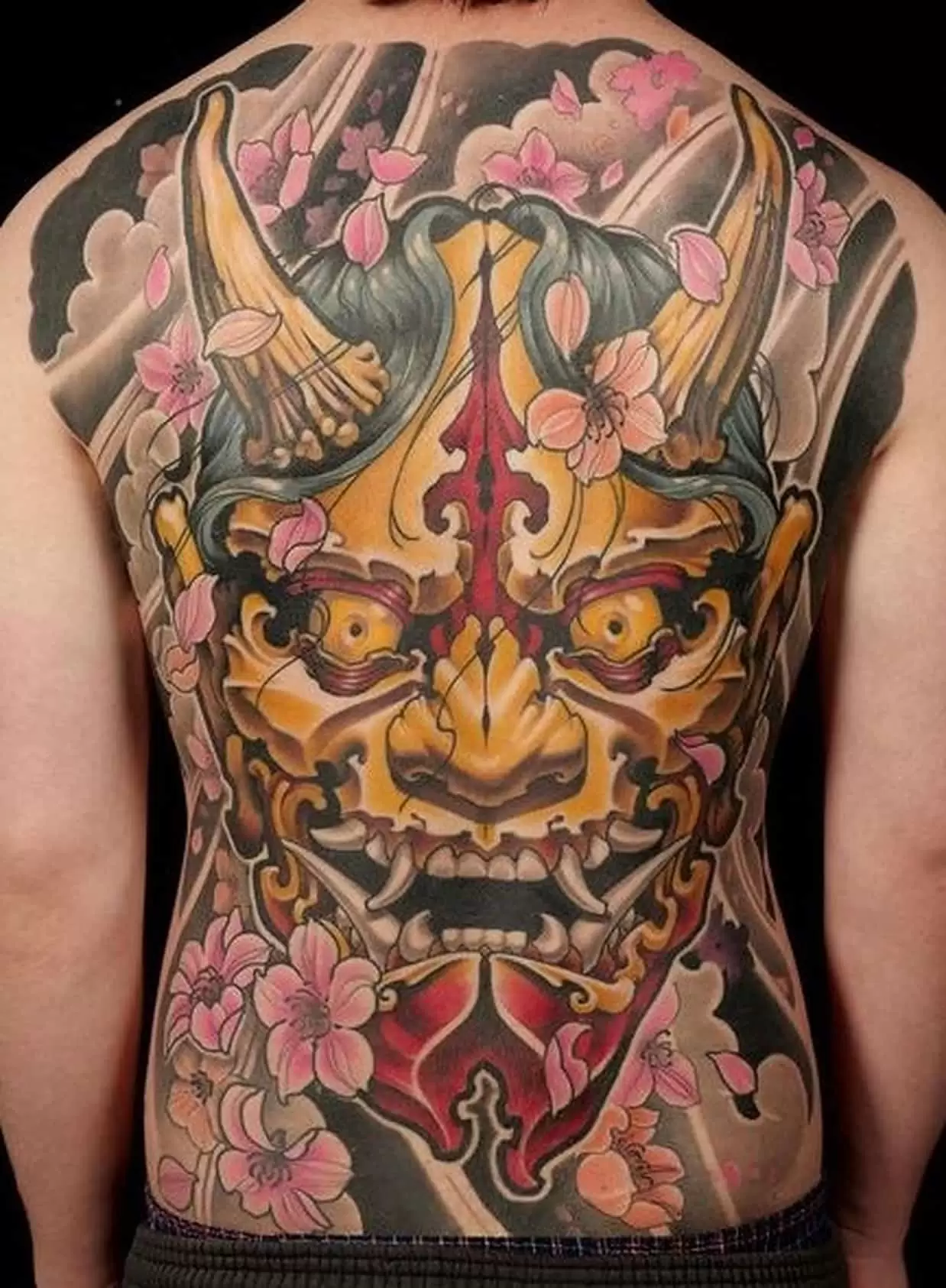
Photo credit: Tatt Mag
Oni are demons, ogres, or trolls known as Yokai that are commonly portrayed as fearsome creatures with wild hair, horns, and fanged teeth, wielding iron clubs, known as kanabō.
Oni are typically associated with evil and destruction, often appearing as the antagonists in various stories and myths.
Oni were considered punishers of the wicked, residing in hell (Jigoku) and meting out tortures to the damned souls. This gives the Oni duel symbolism of being either evil or punishers of the wicked.
Oni can represent a number of things, including protection from evil, the overcoming of obstacles, and the dispelling of bad luck or disease.
Despite their evil appearance and reputations, Oni are multifaceted, embodying aspects of punishment and protection.
Choosing to get an Oni mask tattoo can signify your own personal battle, a choice to have the Oni as your guardian, or to symbolize your connection to the more mystical, darker aspects of life.
Hannya Mask Tattoo
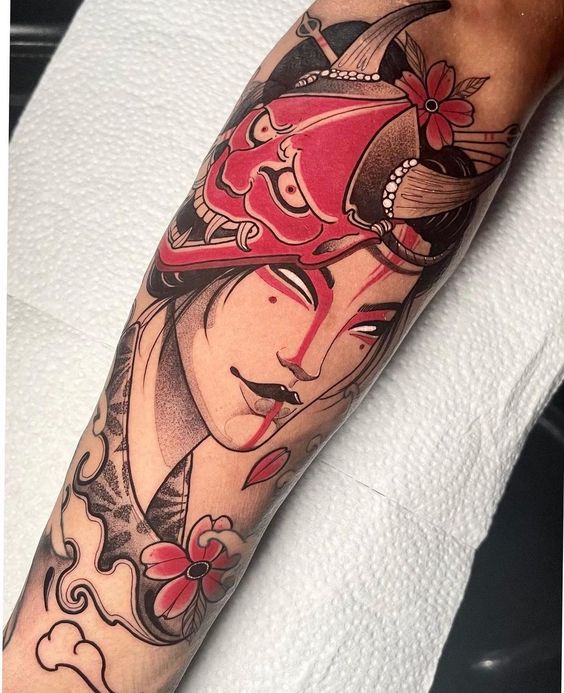
Photo credit: Ink-Match
The Hannya mask embodies the complexity of human emotions and the darker aspects of love and jealousy.
This mask represents a woman transformed into a demon by intense feelings of jealousy and rage, yet she still retains traces of sorrow and her other human emotions.
Hannya masks are symbols of complex emotions, representing the transformation of feelings of envy and despair into demonic rage.
They embody the depth of human emotions and the consequences of intense passion.
Despite its terrifying appearance, the mask is designed to convey the tragic and tormented nature of the Hannya, caught between her demonic form and her lingering human emotions.
Inking yourself with a Hannya mask tattoo might signify your personal struggles with your own emotions or experiences with heartache.
Tengu Mask Tattoo
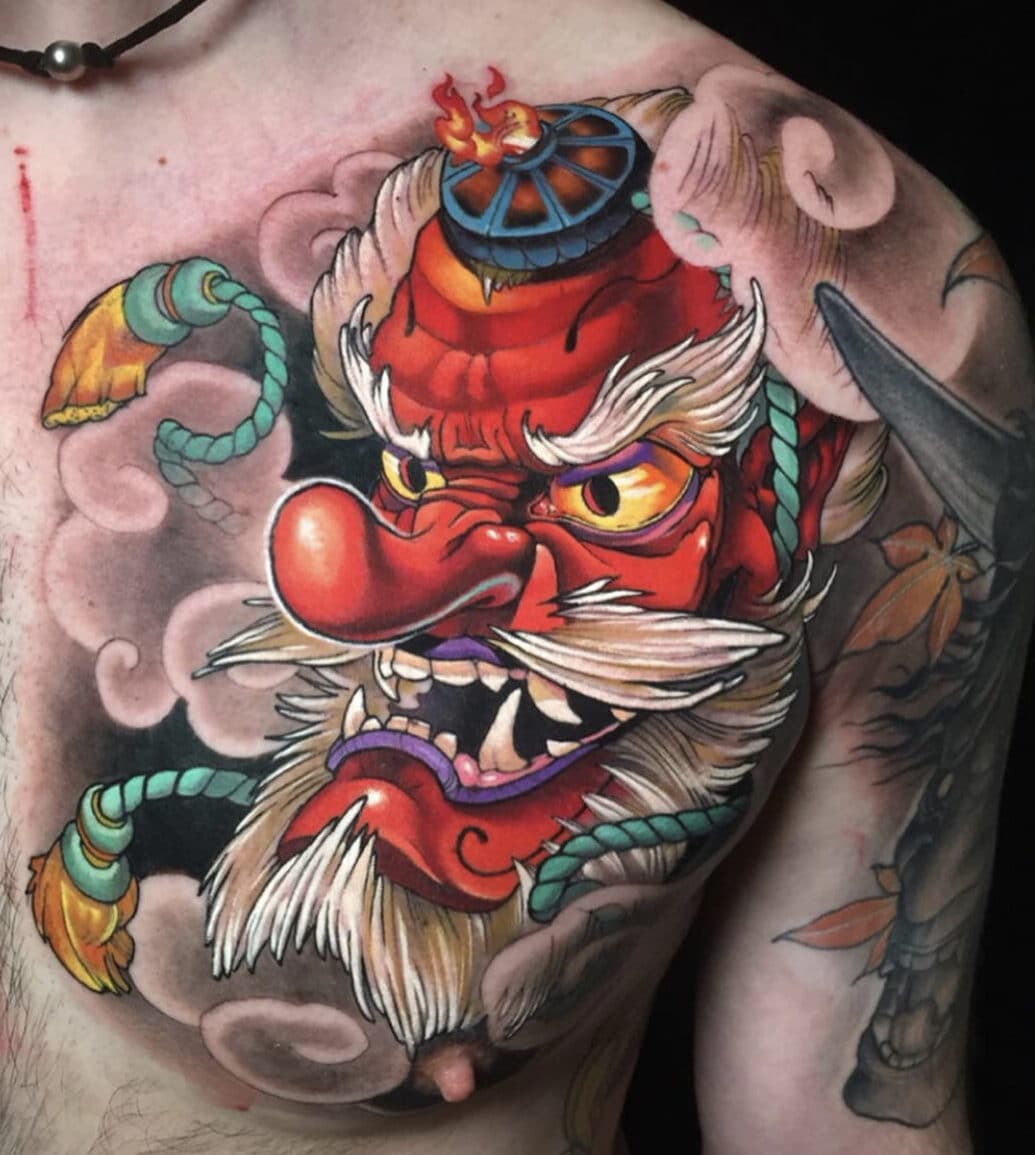
Photo source: Tattoo Life
Tengu are often depicted as bird-like creatures with human characteristics. They are known for their long noses or beaks, red faces, and sometimes wings, blending human and bird-like features.
Initially, Tengu were viewed negatively, associated with demons and harbingers of war. However, over time, that image changed as they came to be associated as guardian spirits of the natural world and as skilled warriors.
In some stories, they are even depicted as knowledgeable priests who possess a deep understanding of the Dharma (Buddhist teachings).
Tengu mask tattoos symbolize guardianship, the mastery of martial arts, and a connection to the natural world.
They can also represent the overcoming of pride and the pursuit of enlightenment.
Tengu are traditionally considered to be protectors of the mountains and forests, residing in secluded areas far from human settlements.
Choosing a Tengu Mask Tattoo may indicate a connection to nature, a passion for martial arts, or a journey toward self-improvement and spiritual growth.
Kitsune Mask Tattoo Ideas
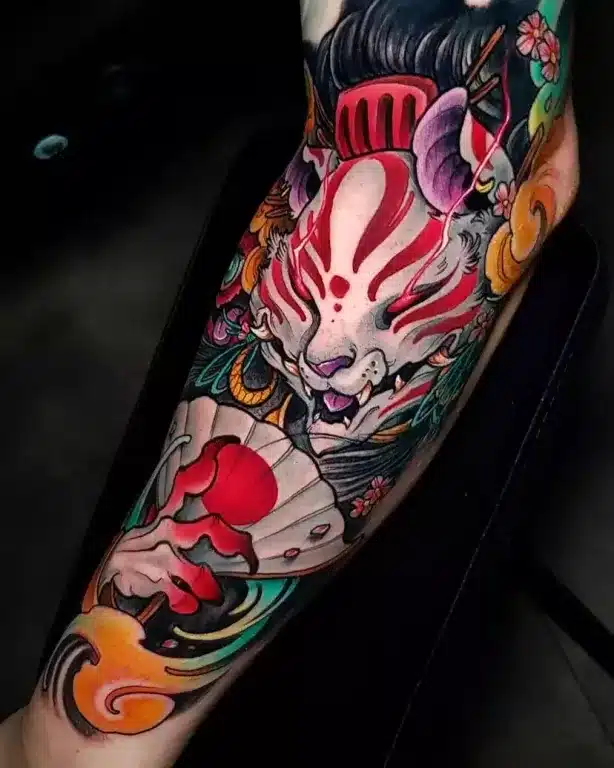
Photo credit: Tatt Mag
Kitsune masks serve as physical representations of the fox spirits' presence and influence. Kitsune masks are characterized by their distinctive features such as pointed ears, narrow eyes, and often a red or white color scheme
Kistsune are known for their ability to transform and have great intelligence and mystical powers.
The design of Kitsune masks can vary widely, with some masks crafted to depict the benevolent Zenko Kitsune, while others have more serene and peaceful expressions, often associated with the deity Inari and symbolizing prosperity, success, and good fortune.
There are also Kitsune masks that represent the more mischievous or malevolent Yako Kitsune.
These masks might have more cunning or sinister expressions, embodying the trickster aspect of the Kitsune lore.
Getting a Kitsune Mask Tattoo might reflect the wearer's adaptability, wisdom, or their playful and mysterious sides.
Noh Mask Tattoo
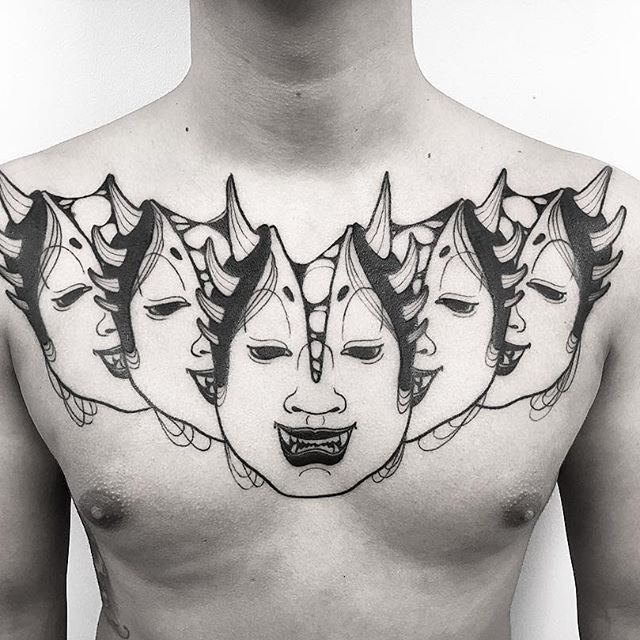
Photo credit: jonathanvandyck website
Noh masks are a part of Noh theater, a classical form of Japanese musical drama that has been performed since the 14th century.
These masks are used to represent characters such as women, men, the elderly, and supernatural beings like ghosts, deities, and demons.
Each Noh mask embodies a specific character type, emotion, and role within the performance.
Noh masks are categorized into five main groups based on the characters they represent:
- Women (Onna-men)
- Men (Otoko-men)
- Elders (Jō-men)
- Gods (Kami-men)
- Demons
- Supernatural beings (Onryō-men)
Opting for a Noh mask tattoo can indicate an appreciation for traditional Japanese arts and culture, as well as a connection to the emotional depth symbolized by the masks.
Samurai Mask Tattoo Ideas
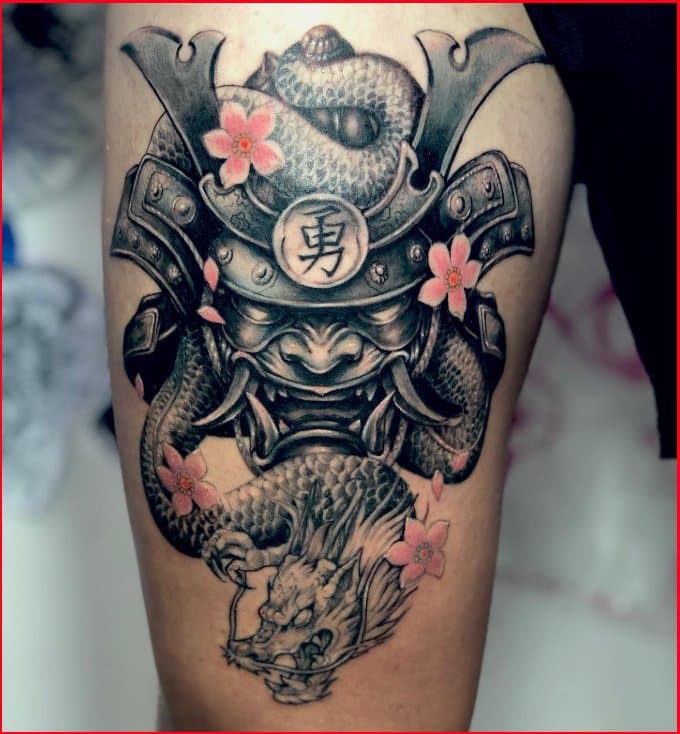
Photo credit: Impeccable Nest
Samurai masks or "mengu" in Japanese, are traditional armor worn by the samurai.
These masks were not only pieces of military equipment but also had deep symbolic meanings that demonstrated the wearer's status, personality, and aesthetic sensibilities.
The most well-known type known as Menpō, covers the face from the nose to the chin, often featuring a fierce expression to intimidate opponents.
Samurai Mask Tattoos reflect various attributes associated with the samurai, such as honor, strength, loyalty, and the warrior's spirit.
The meaning of a samurai mask tattoo can vary depending on the wearer's interpretation which may include honor and respect, strength and courage, protection, or loyalty and duty
Getting a Samurai Mask Tattoo symbolizes the values and aesthetics associated with the samurai culture of feudal Japan.
Hyottoko Mask Tattoo Designs
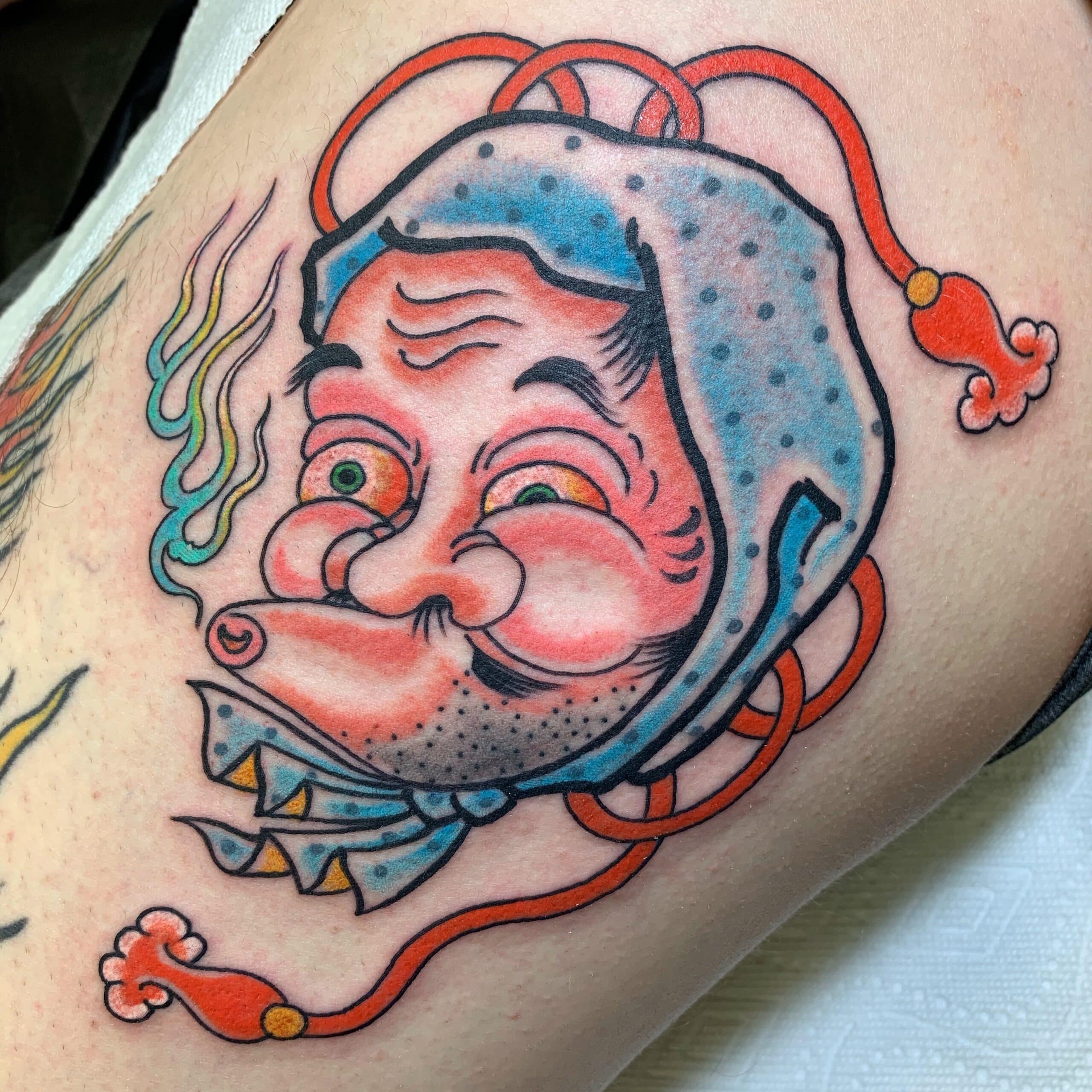
Photo credit: Tattoodo
Fans of Demon Slayer: Kimetsu no Yaiba will be very familiar with this design.
The origins of the Hyottoko character and mask are rooted in folklore and vary by region in Japan. One popular story suggests that the character is based on a boy with a peculiar face who could create gold out of his belly button.
He was also known to generate fire by blowing through a bamboo tube, a trait often depicted in dances and performances involving the Hyottoko mask.
Hyottoko masks are traditionally used in dances and festivals, particularly in rural areas of Japan.
The character is often portrayed dancing with a bag slung over his shoulder and blowing fire with a bamboo tube, providing entertainment and laughter to the audience.
A Hyottoko tattoo can represent a love for laughter, humor, and the importance of not taking life too seriously or can represent prosperity and good fortune reflecting the folklore associated with the character.
A Hyottoko mask can symbolize the wearer's own uniqueness and individuality. It may represent a celebration of one's own quirks and a rejection of conformity.
Other Types of Japanese Mask Tattoo Designs
Anime and Manga-Inspired Masks
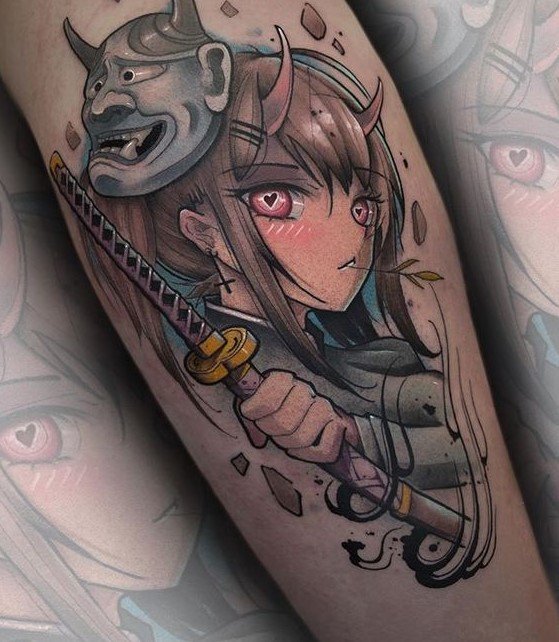
Photo credit: VeAn Tattoo
Characters from popular anime and manga series often wear distinctive masks, which have become iconic in their own right.
For example, masks from series like "Naruto" (e.g., the Anbu masks), "Bleach" (e.g., Hollow masks), JoJo’s Bizarre Adventure (e.g., Stone Mask) or "Tokyo Ghoul" (e.g., Kaneki's mask) are popular choices for tattoos, representing the characters' identities, powers, and the themes of the series.
Video Game-Inspired Masks
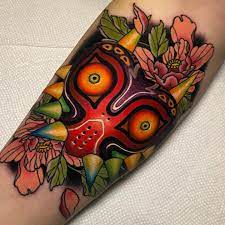
Photo credit: Instagram
Masks from video games can also serve as compelling tattoo ideas.
Masks like Majora's Mask from "The Legend of Zelda" series, the masks worn by characters in "Persona," or the variety of masks worn by Jin Sakai from Ghost of Tsushima are all deeply symbolic within their respective game worlds and can represent the themes of transformation, identity, and adventure.
Superhero and Villain Masks
The masks of superheroes and villains from comic books and movies, though not always Japanese in origin, have become popular worldwide and can be adapted into a style that pays homage to Japanese aesthetics.
For example, a tattoo of Batman's cowl or Spider-Man's mask can be reimagined with traditional Japanese design elements, blending pop culture with traditional artistry.
Mech and Robot Masks
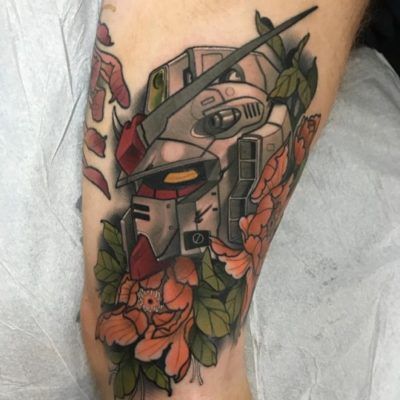
Photo credit: Pinterest
Its debatable if the visors and faceplates of robots and mechs from series like "Gundam," "Neon Genesis Evangelion," or "Voltron" can be classified as masks, but they also make for unique and visually striking tattoos.
These designs can symbolize strength, technology, and the futuristic vision that is often explored in Japanese media or maybe you just like cool looking robots!.
Best Japanese Mask Tattoos
Japanese Mask and Dragon Tattoo
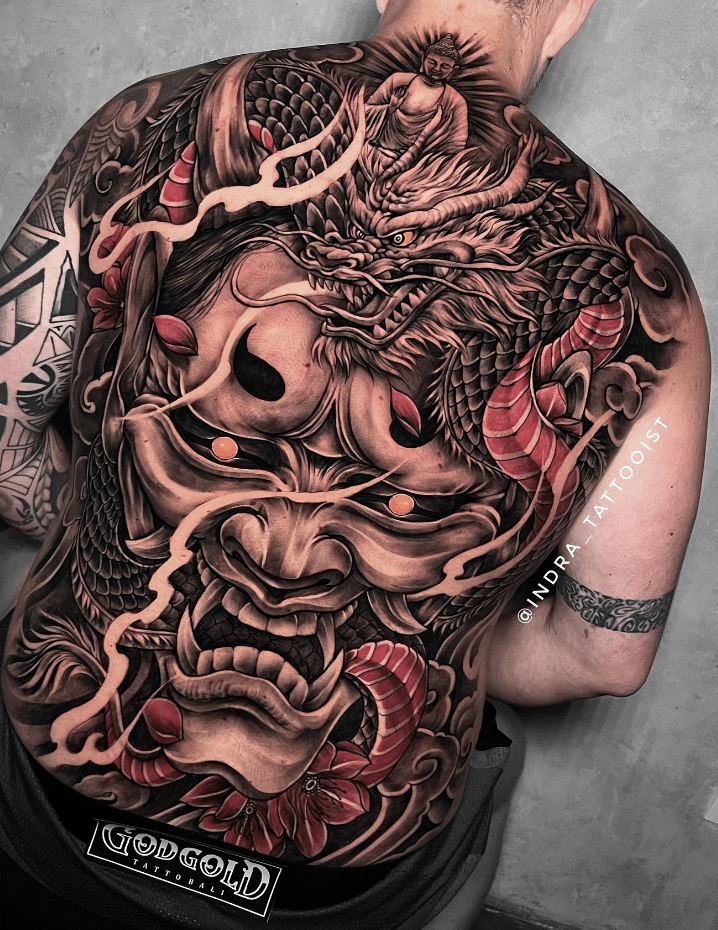
Photo credit: @indra_tattooist
Dragons come with a lot of meanings in Japanese culture, from power and protection to weather and the seasons. Try adding a Japanese Dragon Tattoo to your Oni Mask Tattoo to increase its symbolic meaning.
Japanese Dragons are wise creatures known to help guide people through the trials and tribulations of life, so paired with an Oni Mask, while the Dragon guides you, the Oni protects you from evil spirits.
Kitsune Mask With Swords Tattoo
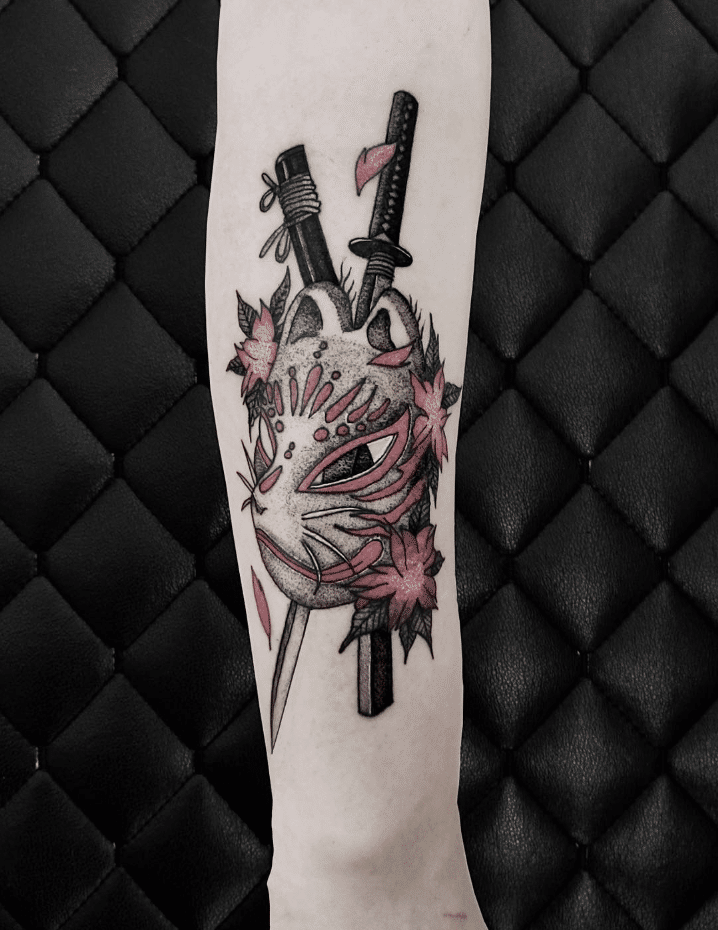
Photo credit: @heinekendelisi
If you want to show off your warrior spirit, then try out a Kitsune Mask tattoo with swords. Kitsune are sly creatures, so it’s quite often in anime and video games to depict a warrior with a Kitsune mask.
This Kitsune Tattoo Mask is really well done with nice coloring that gives it a used look as if it has seen battle countless times.
Butterfly Oni Japanese Mask Tattoo
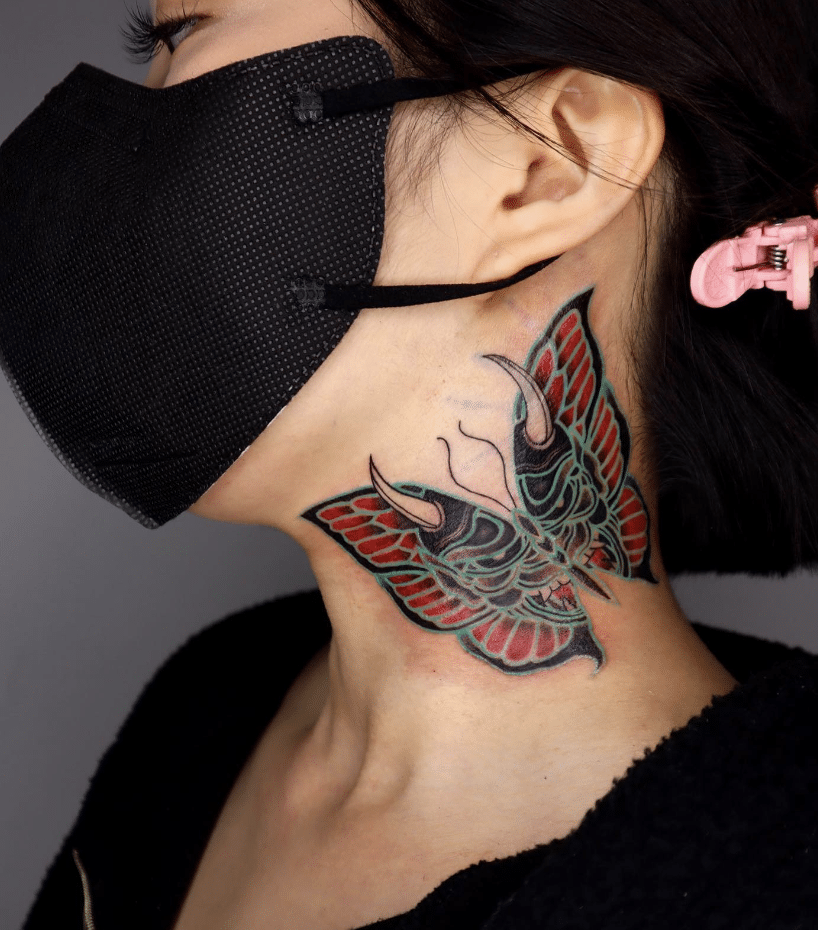
Photo credit: @hoonah.kim
Oni are mischievous and fiendish creatures that can shape-shift to help sneak into places they aren’t welcome.
So imbue your Butterfly Tattoo with the face of an Oni to honor your naughtier side. This Tattoo is absolutely mesmerizing with its gorgeous coloring and intricate details.
Japanese Mask Tattoo With Koi Fish
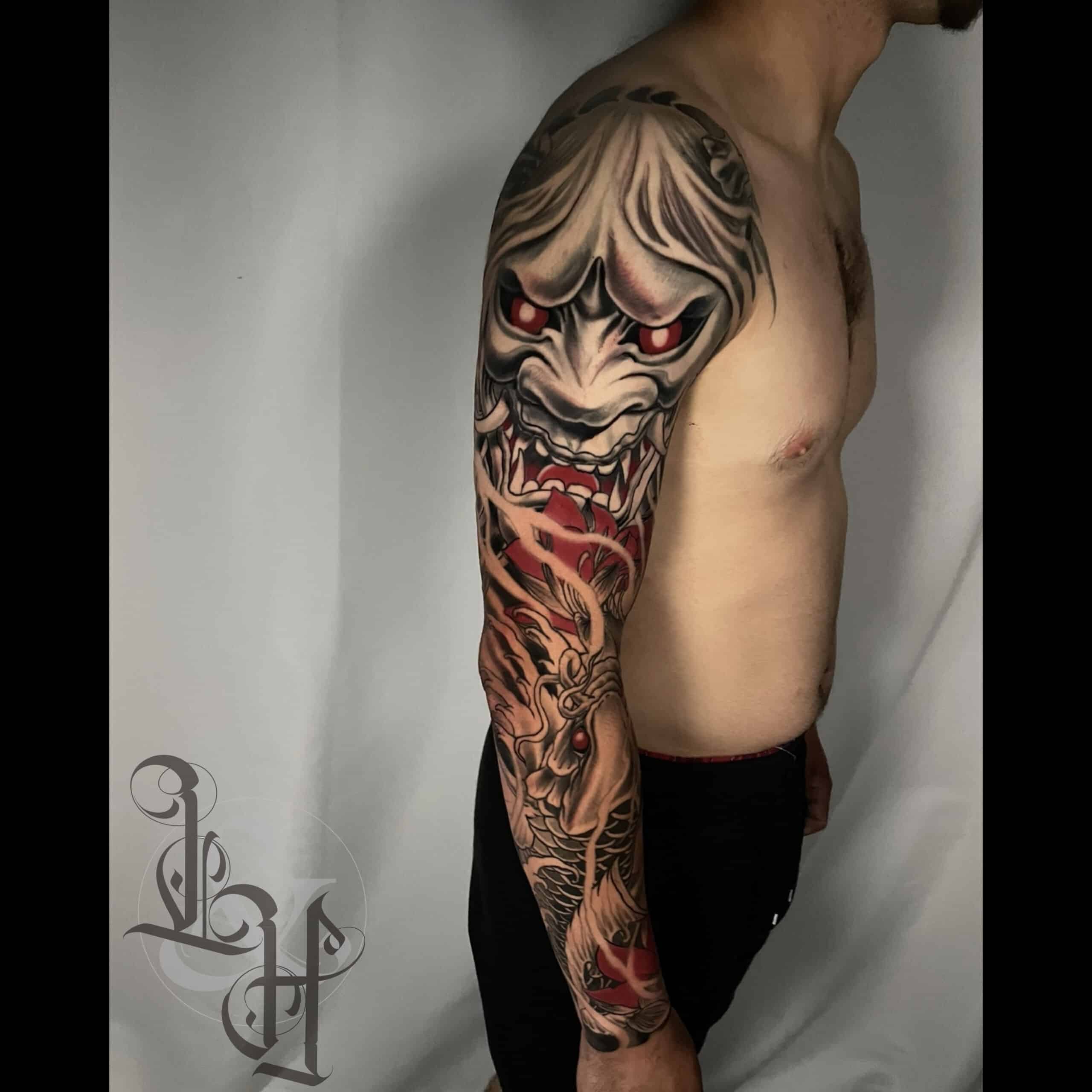
Photo credit: Love n Hate
Koi Fish Tattoos symbolize strength, perseverance, and good fortune. Koi fish are often associated with the story of the Koi Fish that swam up a waterfall to become a mighty Dragon.
This Koi and Oni mask sleeve tattoo design is really excellent, with phenomenal detailing and shading done on the mask. I particularly love how the Koi has a demonic look to itself through its eye.
Ghost Oni Mask Tattoo Idea
If you want your Japanese Mask to look even more spooky, then add in a ghost beneath the mask, like in this design.
This design is spectacular, with beautiful bold colors and a nice addition of some florals as well.
Hyottoko Irezumi Tattoo
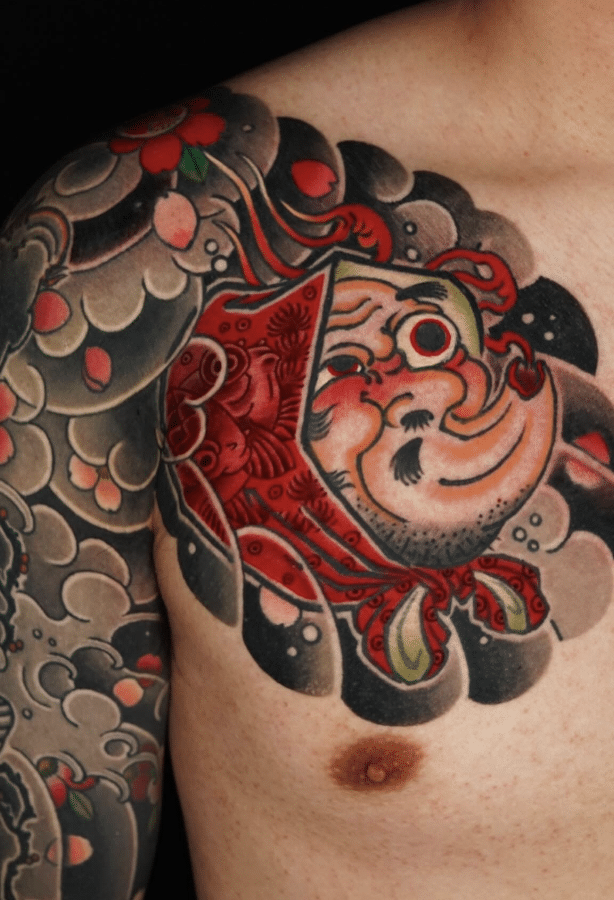
Photo credit: @core__labs
Irezumi Tattoos date back to the 17th century when criminals would be branded with Tattoos to signal their crimes.
Irezumi Tattoos have evolved over the years, being heavily connected with the Yakuza, but you don’t need to be a part of the criminal syndicate if you want to choose this style.
Tengu Mask With Tounge
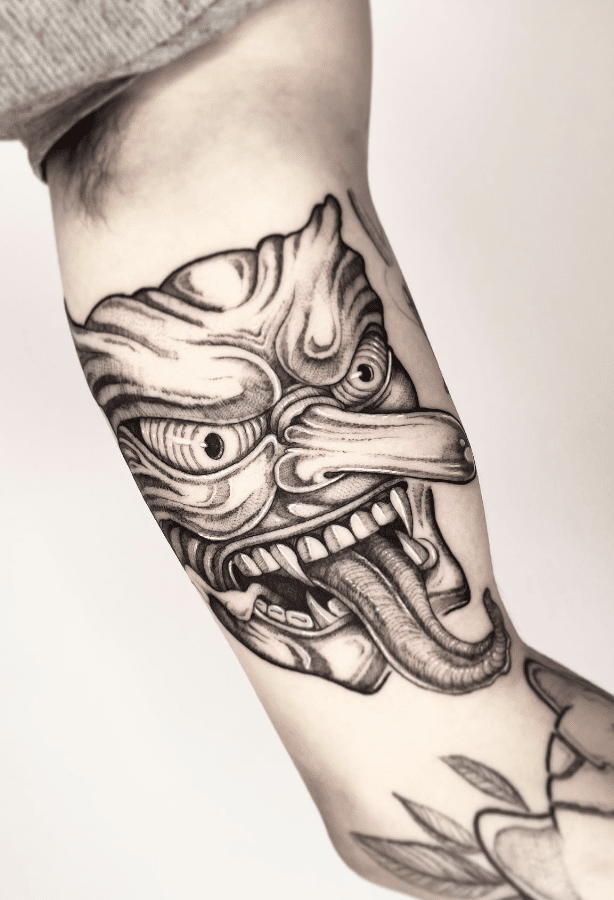
Photo credit: @eyepatch.tattoo_
If you want to add a more sinister look to your mask, think about adding other elements to its design, like this Tengu tongue design.
This is a really great design with fantastic detailing and shading, along with the creepy tongue and manic-looking eyes.
Okina Mask Tattoo Idea
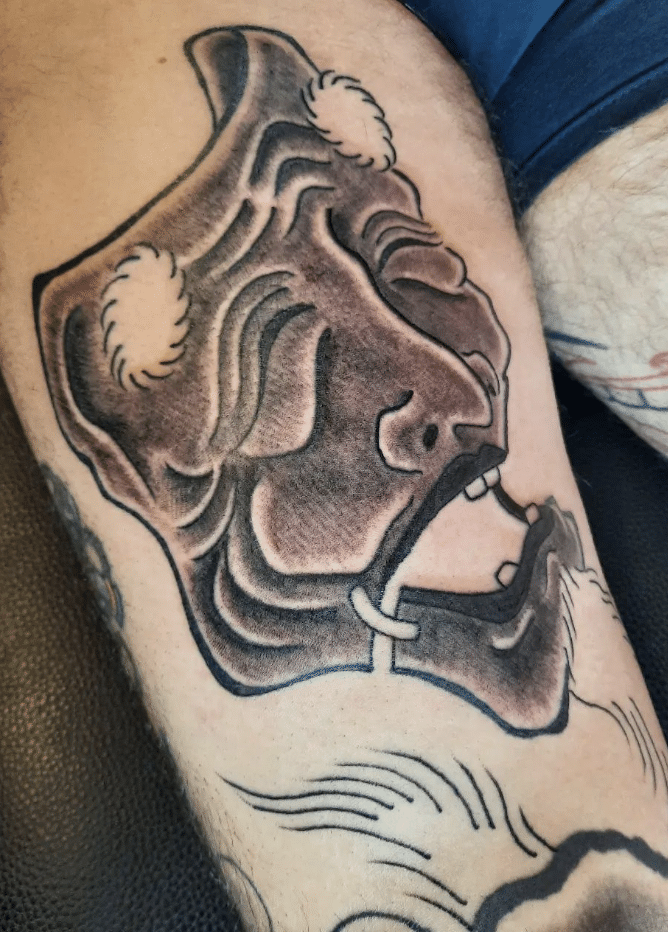
Photo credit: @brunelli.irezumi
The Okina (old man) mask is one of the Noh masks and is considered particularly sacred with it at times being treated as the embodiment of god, bringing longevity and prosperity to families.
The mask is the oldest of the Noh masks and represents an older male with a long white beard expressing wisdom
Mask In Blade Tattoo
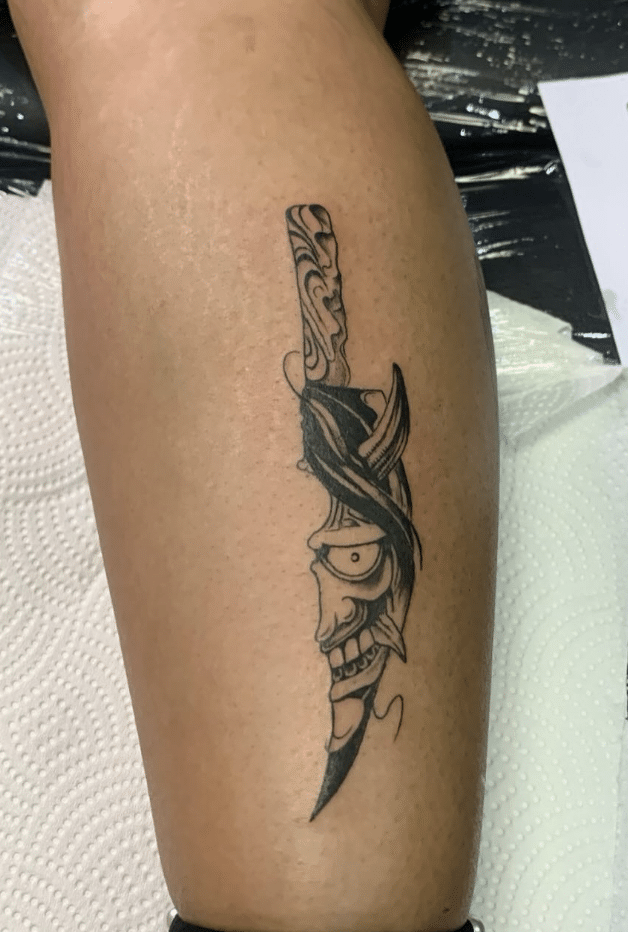
Photo credit: @terrencek_s.a
If you want to add an edge to your Japanese mask Tattoo, then add a blade to its design.
Blade tattoos can have various meanings depending on the design and context, but generally, they symbolize strength, power, and courage.
This incredible design has the face of an oni mask within the blade, possibly symboling that the blade is cursed.
Kunai Japanese Mask Tattoo
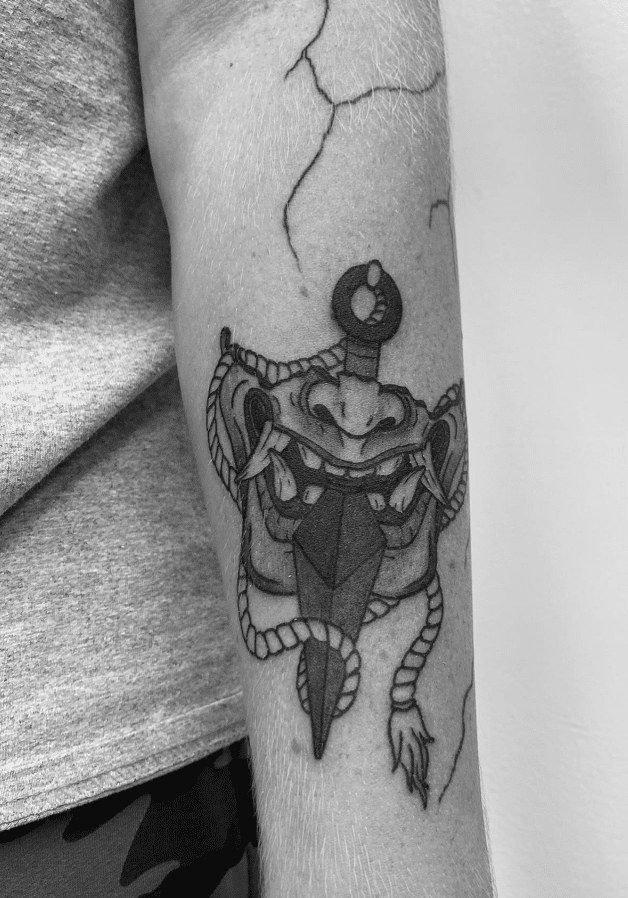
Photo credit: @aeipathy.tattoo
A Kunai is a Japanese tool thought to be originally derived from the masonry trowel.
Kunai have become synonymous within ninja folklore, who use them to climb walls or in video games where they are used to throw them at your enemies to stun of kill them. This design has a half-Japanese mask with a Kunai through it.
Japanese Mask And Snake Tattoo
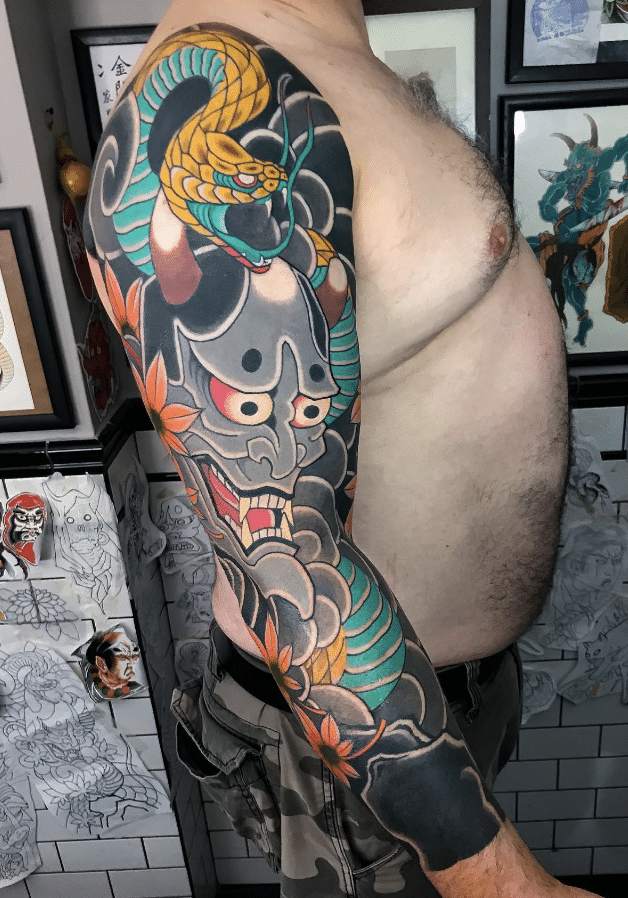
Photo credit: @orochidavide
Snake Tattoos can represent rebirth, transformation, or renewal, calling to mind the way a snake sheds its skin as it grows and changes. However, when paired with the Oni they are giving a more ominous connotation.
For whatever reason snakes are often depicted as evil creatures so if you want to give your Japanese Mask Tattoo a darker feel, pair and Oni Mask along with a Snake Tattoo.
Split Kitsune Mask Tattoo
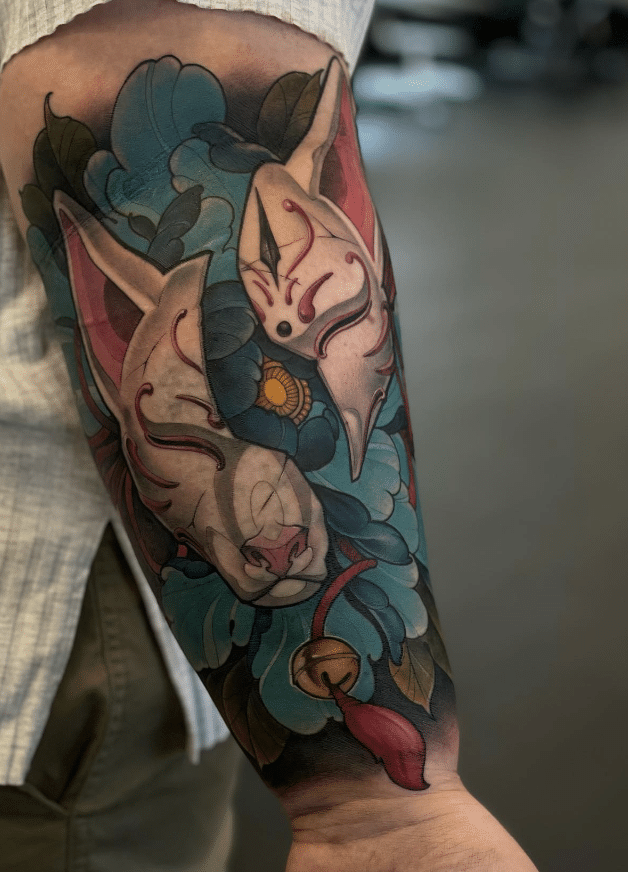
Photo credit: @cappellini_ink
A broken Japanese Mask Tattoo can symbolize a release from negative emotions, such as rage, jealousy, and anguish, that are associated with a traumatic experience.
This is a lovely design of a split Kitsune Mask with some beautiful florals behind it.
Japanese Mask Sleeve Tattoo
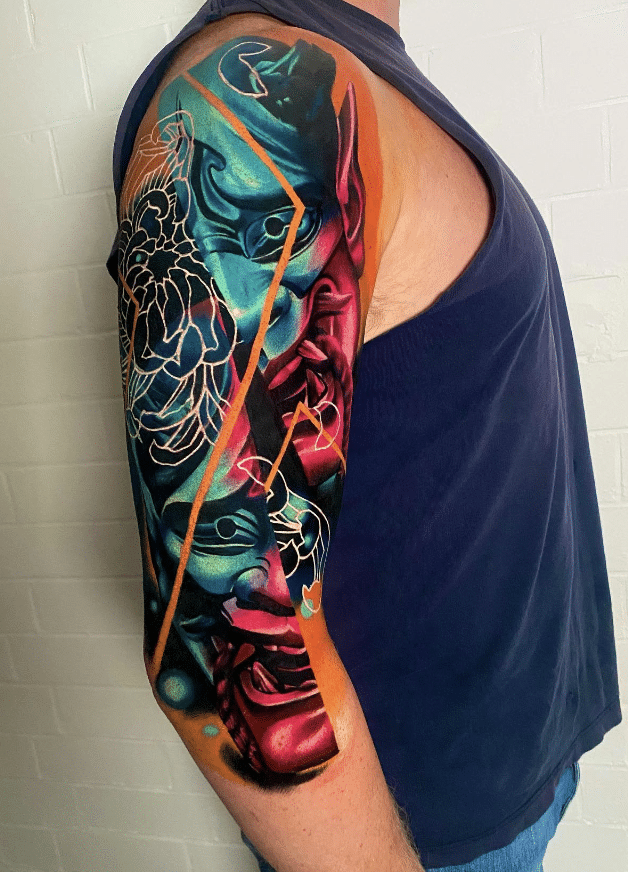
Photo credit: @littleandytattoo
If you want to cover a large section of your body, then consider getting a sleeve Japanese Mask Tattoo.
This sleeve tattoo is absolutely amazing with its great coloring, giving it a sort of neon look to it.
Demon Samurai Mask Tattoo
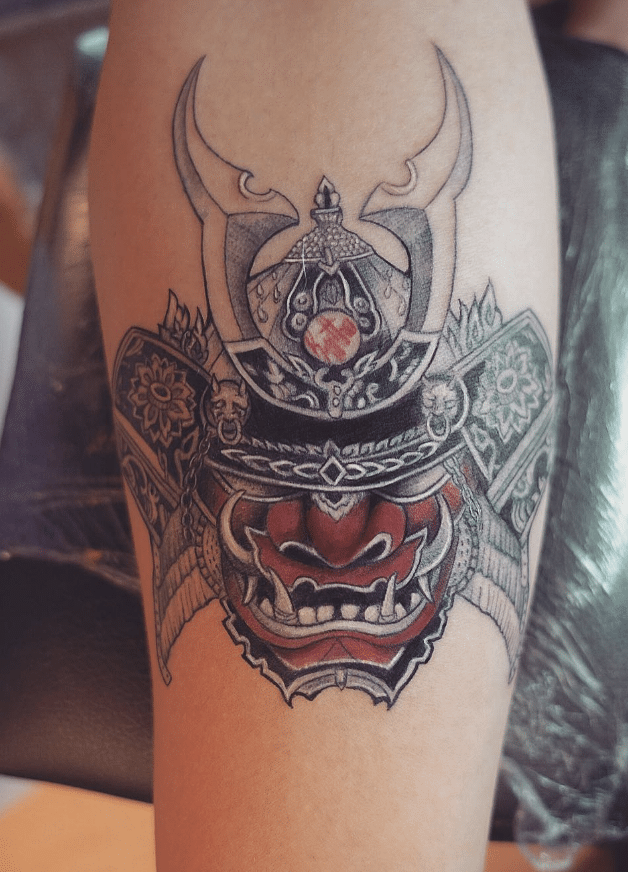
Photo credit: @matcha.shiro
For samurai, masks served as a principal face defense and helped secure the helmet to the head more firmly.
The majority of masks were half-length know as mempo, covering the nose and the face below the eyes.
The surface of the mask was either lacquered or had a dark russet finish with the interiors usually lacquered red.
Surrealist Japanese Mask Tattoo
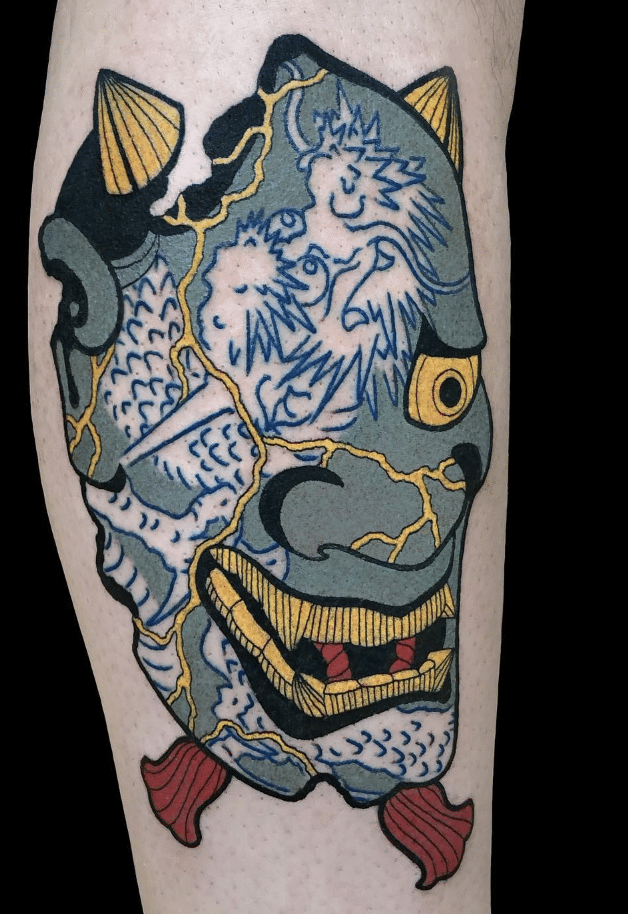
Photo credit: @emanuelesircanatattoo
Surrealist tattoos are inspired by the Surrealism art movement, which emphasizes the bizarre, the irrational, and the dream-like.
These tattoos often feature elements that are fantastical and thought-provoking. This Japanese Mask Tattoo has a Dragon Tattoo and a lightning bolt tattoo within it.
Saru Mask Tattoo
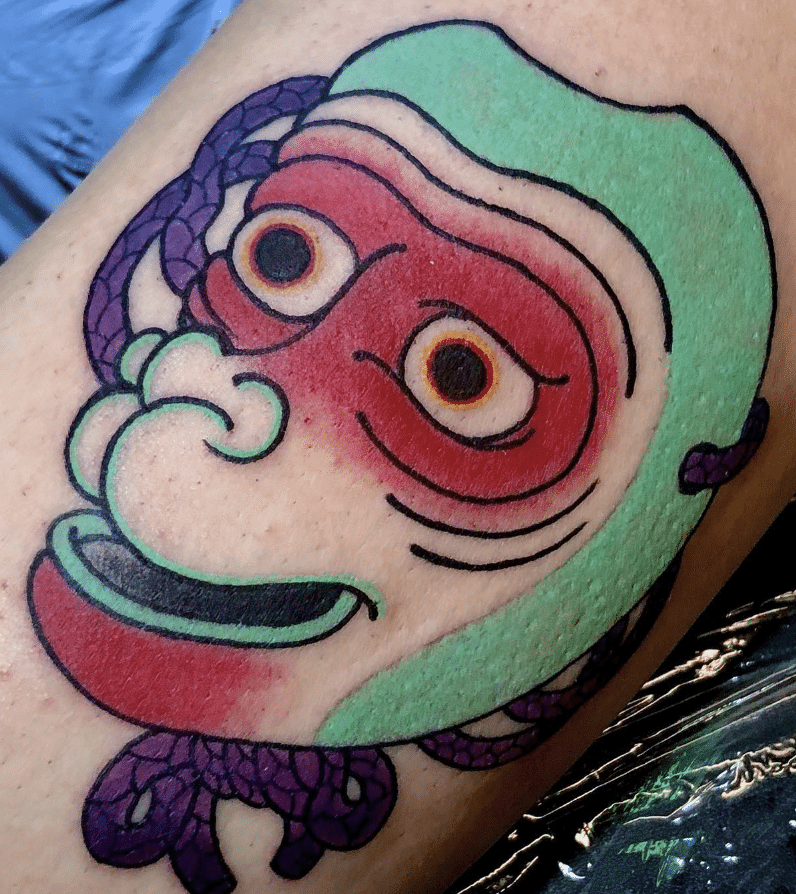
Photo credit: @tommydessaugetattoo
The Saru Mask is a mask depicting a monkey or an ape. The term "saru" is the Japanese word for monkey.
These masks are commonly used in various cultural, theatrical, and spiritual contexts within Japan, particularly in traditional performances and festivals.
Geisha Japanese Mask Tattoo
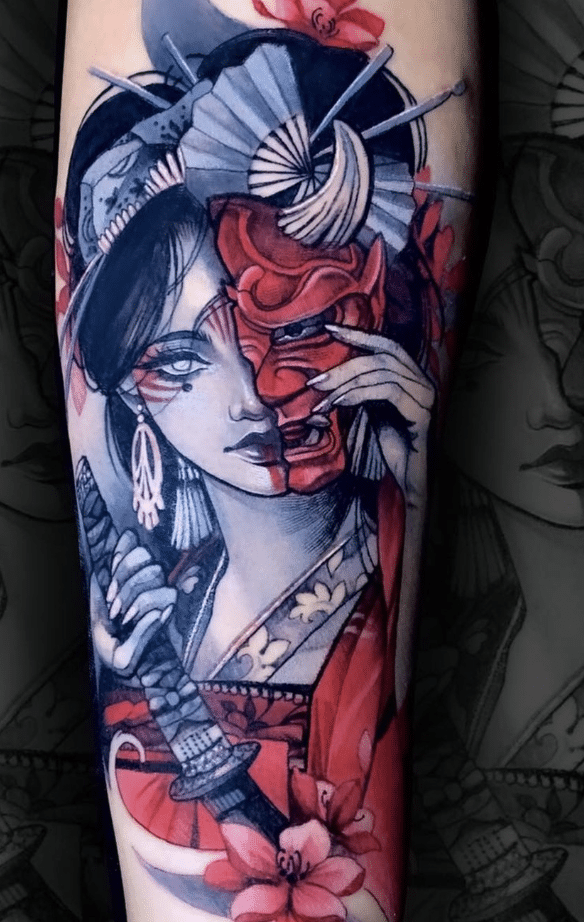
Photo credit: @gabycastel_tattoo
If you want to add a bit of elegancy to your Japanese Mask Tattoo, have a Geisha wear the mask.
Geisha are Japanese female entertainers and performing artists who are trained in traditional Japanese arts.
Their skills include dance, music, singing, playing instruments, calligraphy, tea ceremonies, and flower arranging.
Split Feet Japanese Mask Tattoo
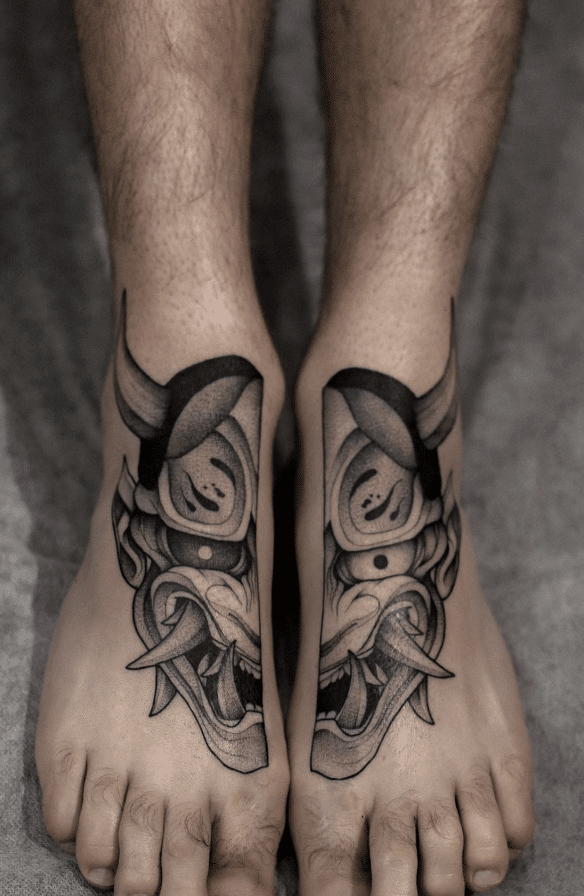
Photo credit: @dmikita_tattoo
To make your Japanese Mask Tattoo a little more dynamic, trying getting it done in a split style.
With a split style you will need to tattoo each side of the mask and different parts of your body that when pushed together make the design whole again. Popular places for this design are the hands and feet as shown.
Matching Japanese Mask Tattoo
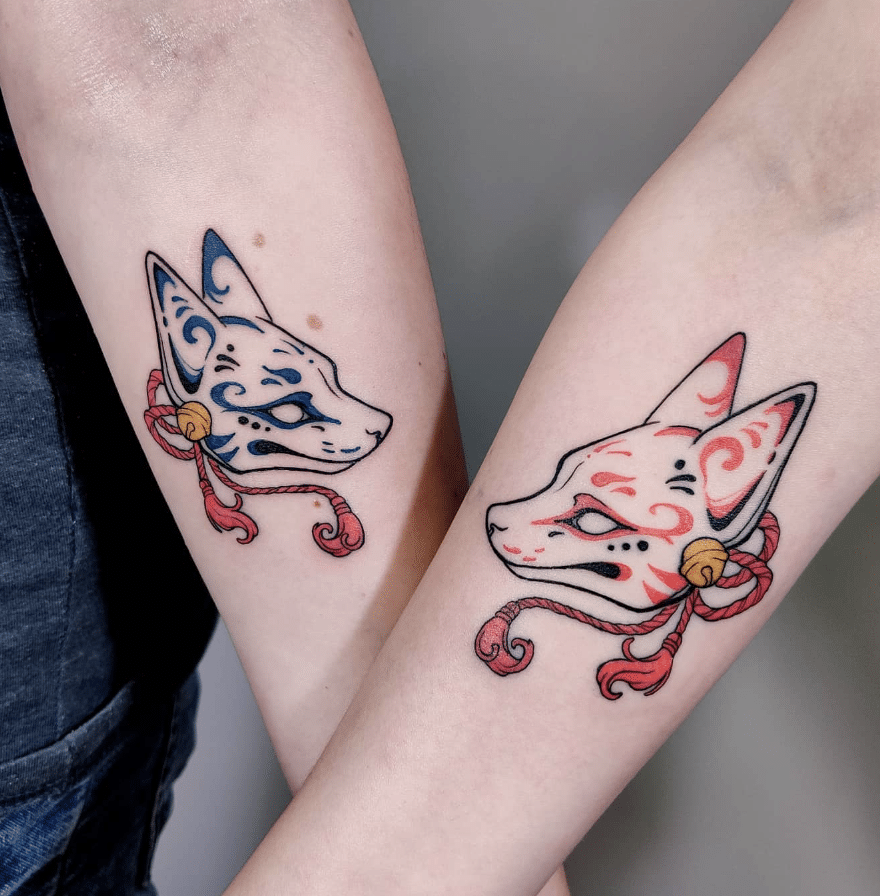
Photo credit: @chestnut_tattoo
If you have a special someone then think about getting a matching Japanese Mask Tattoo.
You can choose from any of the traditional or more modern designs you prefer but your Tattoos should have some indication that they are a matching pair. This design is of two Kitsune Mask but both in slightly diferent colors.
Demon Slayer: Kimetsu No Yaiba Mask Tattoo
This great Japanese Mask design is to honor the battle of Rengoku vs Akaza the Upper Moon 3.
Akaza appears at the end of the Mugen Train Arc to do battle with Rengoku, mortally wounding the Flame Hashira before feeling the battle before the sun destroyed him forever.
Japanese Mask And Sword Tattoo
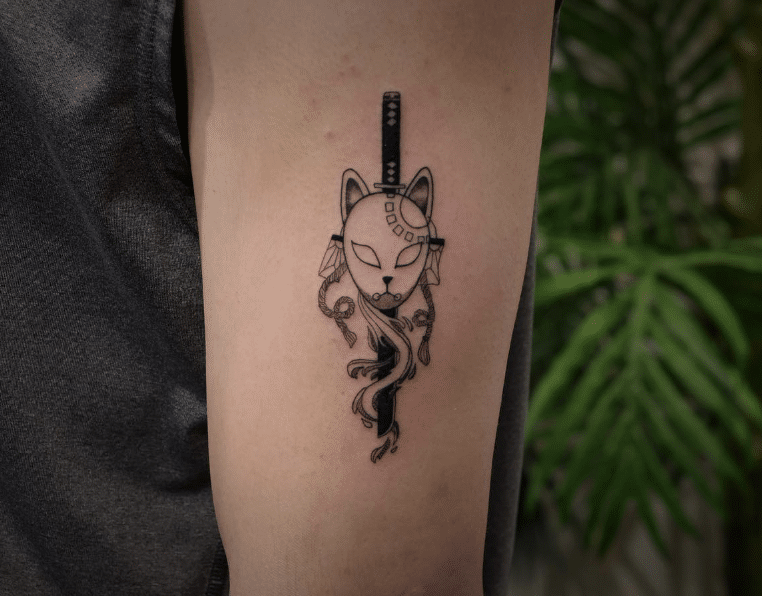
Photo credit: @ttattooylor
Another Demon Slayer Anime Tattoo design, warding masks, are kitsune masks made by Sakonji Urokodaki, who personally hand-carves each for his students to protect them from harm.
However, all thirteen of Sakonji's previous students who wore the masks tragically met their demise at the hands of the Hand Demon before Tanjiro appeared, finally avenging them and laying the demon to rest.
Japanese Mask And Koi Tattoo
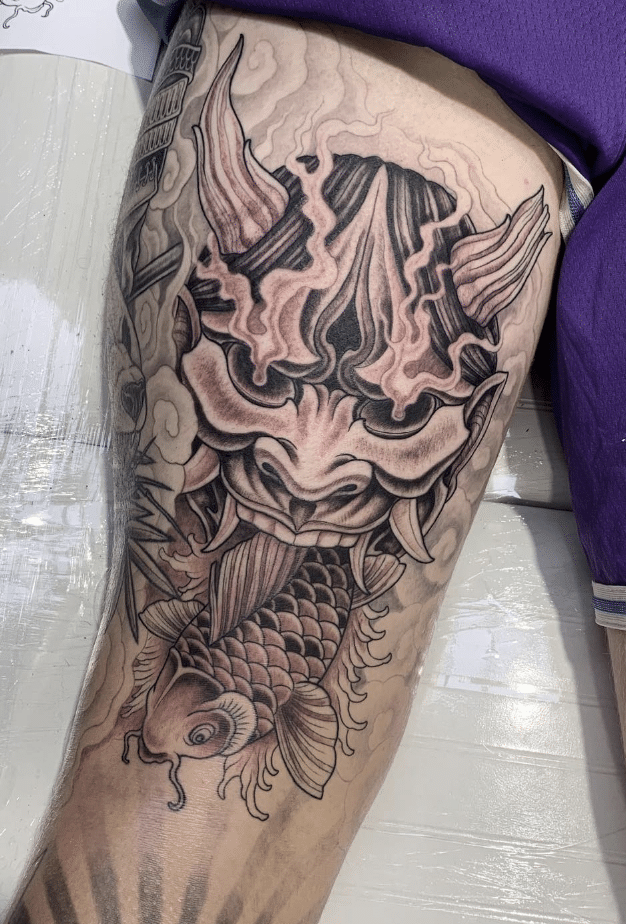
Photo credit: @cameron_jonker
A Koi Fish Tattoo in Japanese culture can symbolize strength, perseverance, and good fortune.
Koi fish are also known for their ability to swim upstream and overcome obstacles, representing resilience and determination. This cool design has the Koi coming from the Oni Mask’s mouth.
Yamato One Piece Japanese Mask Tattoo
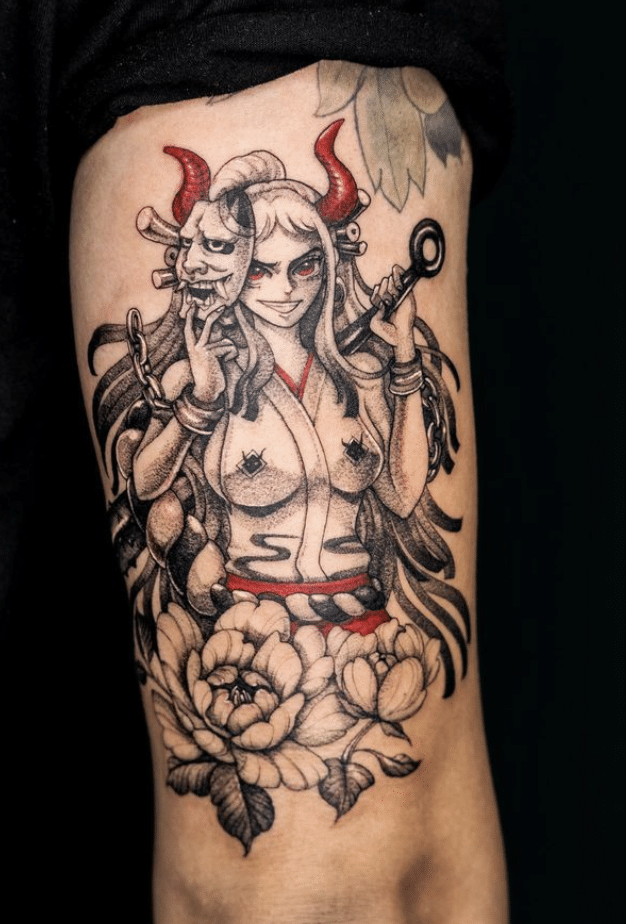
Photo credit: @bigkidstattoostudio
If you’re a lover of one piece then check out this cool One Piece Tattoo. Yamato was originally introduced to us as the son of Kaido so that is probably why she wore the mask in order for the big reveal to show she is in fact a woman, even if she still claims to be Kozuki Oden.
Other mask Tattoos from One Piece are King’s mask, Kikunojo’s mask and Hiyori’s mask.
Grandpa Gohan Dragonball Mask Tattoo
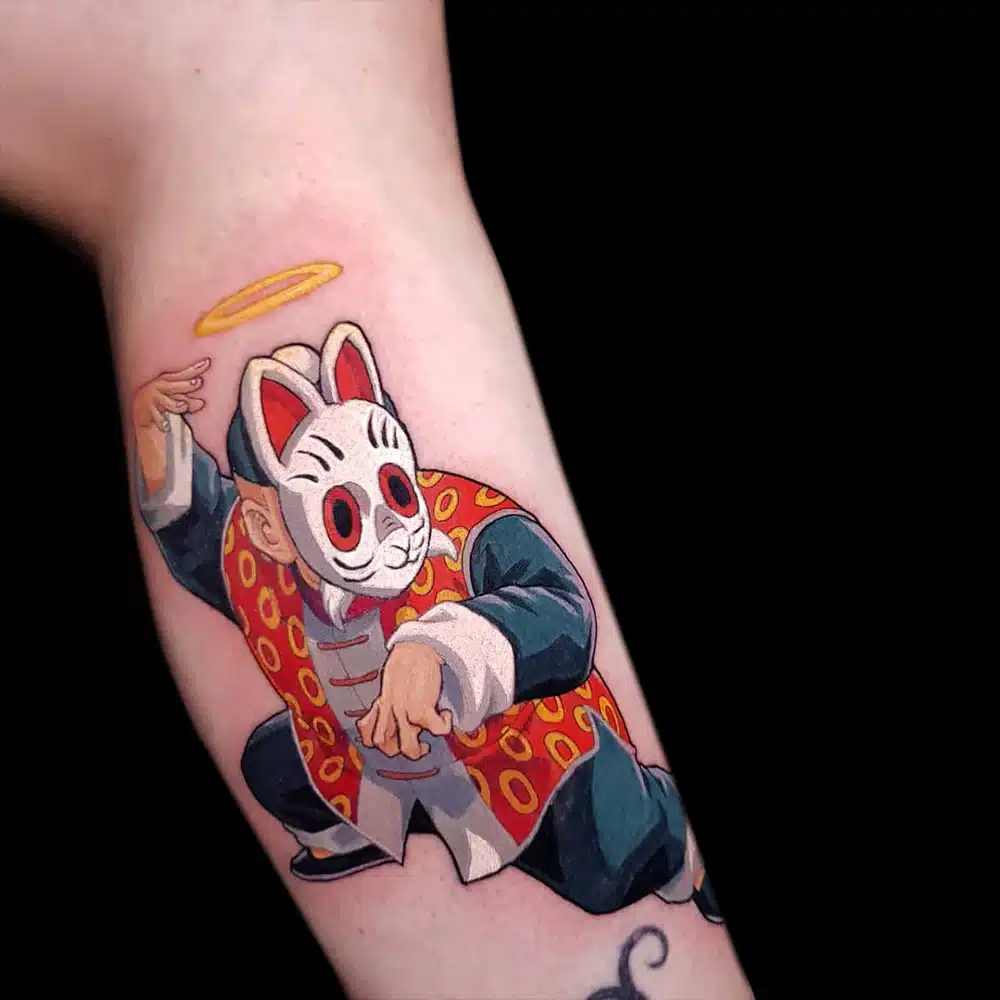
Photo credit: Radiant Colors
If you’re a lover of Dragonball then check out this Japanese Mask Tattoo. Grandpa Gohan was Master Roshi's number one pupil and the adoptive grandfather of Goku.
Grandpa Gohan does not fully debut until his disguised appearance as "The Mysterious Fifth Man" alongside Fortuneteller Baba's other fighters, where he temporarily reunites with Goku.
Kakashi Naruto Mask Tattoo
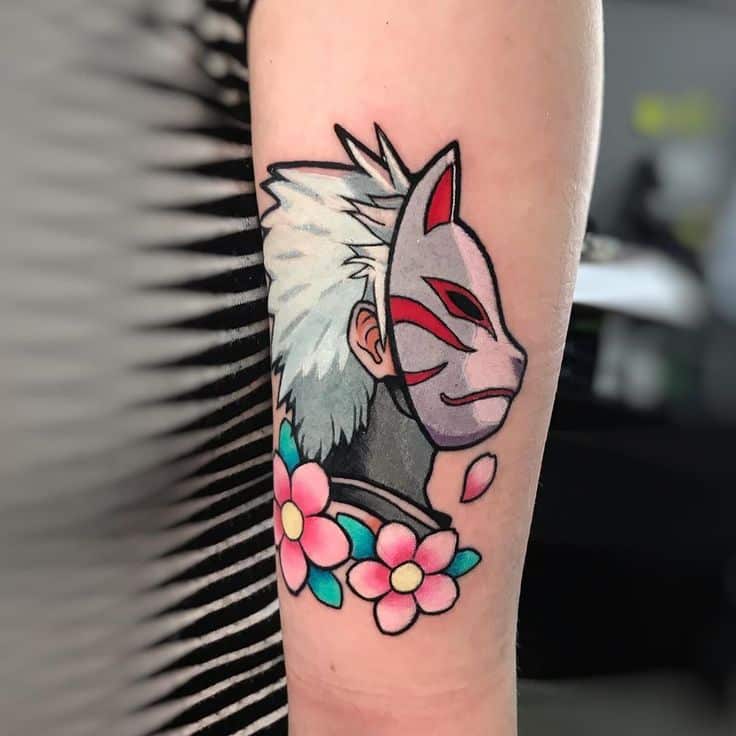
Photo credit: Pinterest
This Naruto Tattoo is of Kakashi, one of Konoha's most talented ninja, regularly looked to for advice and leadership despite his personal dislike of responsibility.
In the Naruto manga and anime, the series creator Masashi Kishimoto has said that he designed Kakashi to wear a mask to make him seem mysterious and to cover his mouth.
Jin Sakai Ghost of Tsushima Japanese Mask Tattoo
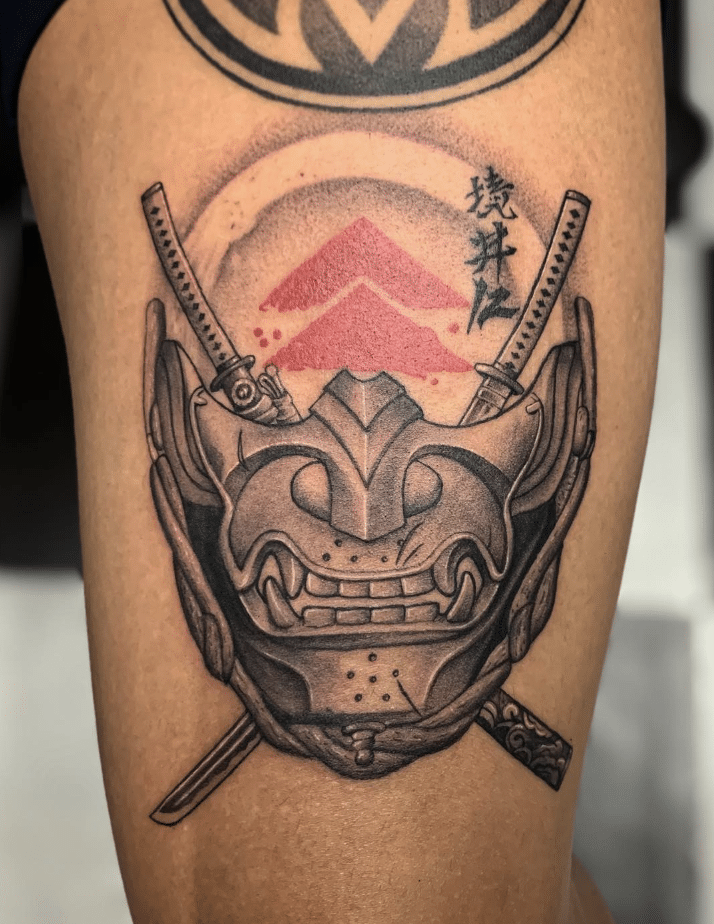
Photo credit: @flyest_xix
Jin Sakai is one of the last samurai of Tsushima who must protect the Island during the first Mongol invasion of Japan.
Jin has a crisis of conscience when he must choose between following the warrior code to fight honorably or using underhanded and dishonorable methods of repelling the Mongols.
Jin is given his iconic Ghost mask, which was made by his dear friend Taka before he enters Castle Shimura to poison the Mongol's airag.
Tokyo Ghoul Japanese Mask Tattoo
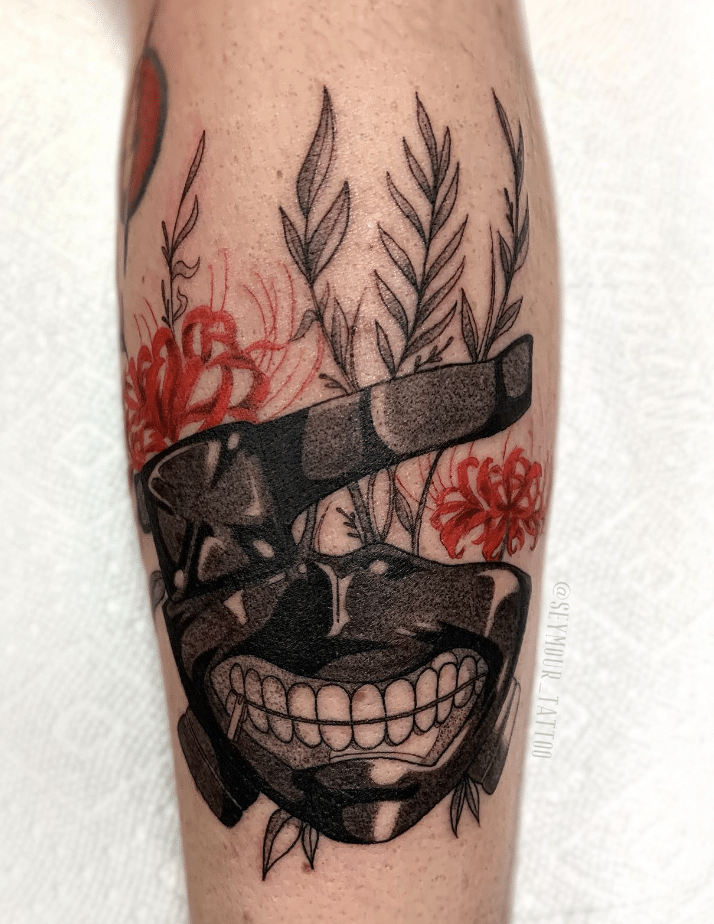
Photo credit: @seymour_tattoo
Tokyo Ghoul is an anime series set in an alternate version of Tokyo, where humans live alongside ghouls. Ghouls are beings who look like humans but survive by eating human flesh.
Ken Kaneki, the wearer of this mask, is a college student who is transformed into a half-ghoul after an encounter with a Ghoul named Rize Kamishiro.
Now he must navigate the complex social and political dynamics between humans and ghouls while struggling to maintain his humanity.
Bleach Japanese Mask Tattoo
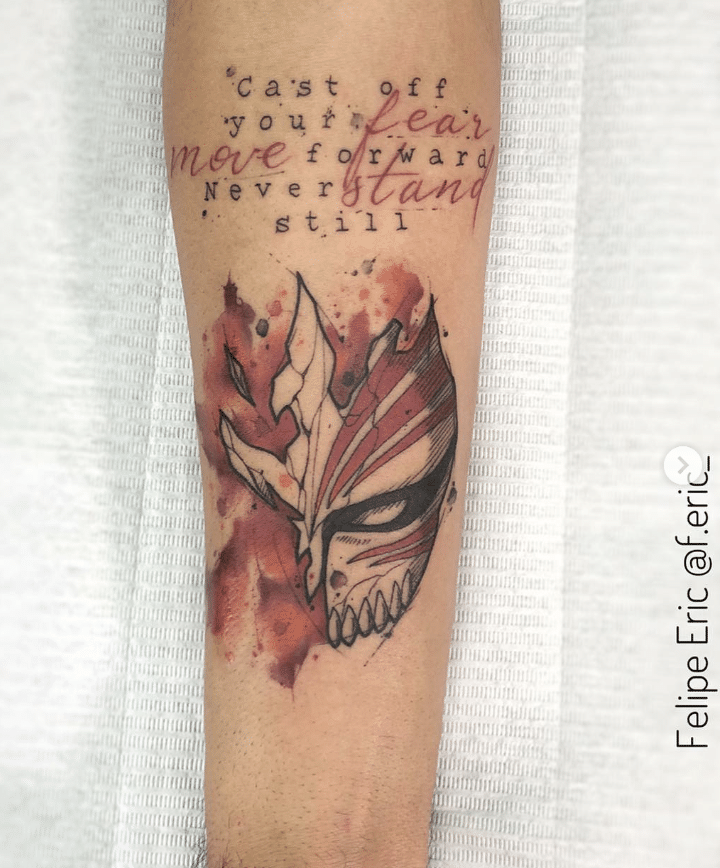
Photo credit: @f.eric_
Bleach is about the adventures of a teenager Ichigo Kurosaki, who obtains the powers of a Soul Reaper, a death personification similar to a Grim Reaper.
With his new-found powers, Ichigo must take on the duties of defending humans from evil spirits and guiding departed souls to the afterlife.
When he puts on his mask, Ichigo attains a hollowized state and becomes a Vizard. In this state, his power levels increase significantly.
Sogeking One Piece Japanese Mask Tattoo
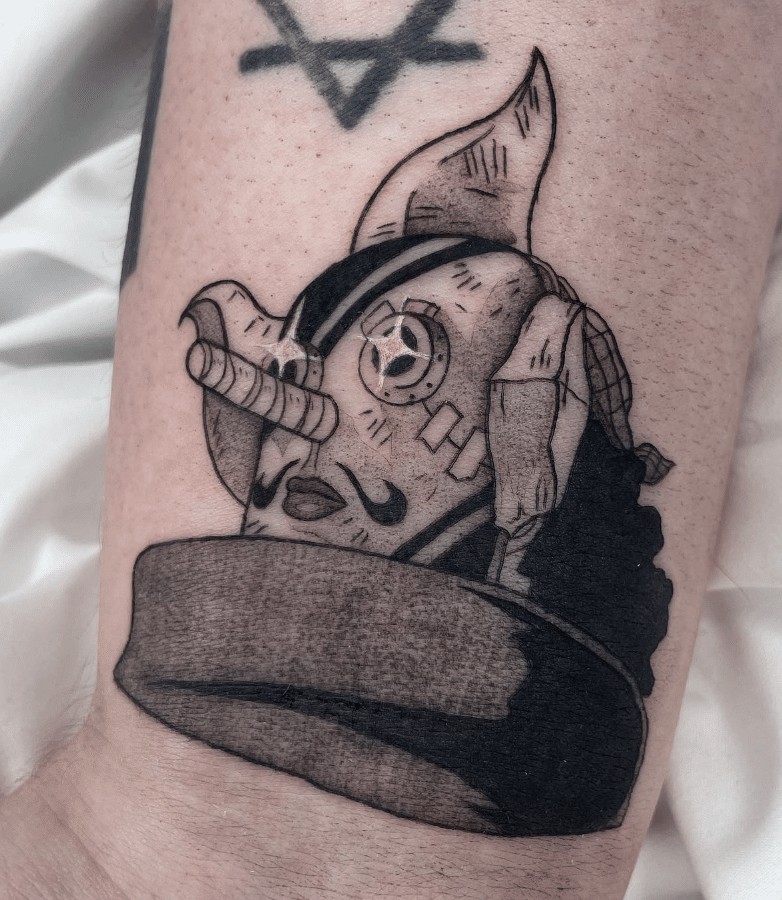
Photo credit: @cutecrab_
This One Piece Tattoo is of Sogeking who comes from the Island of Snipers (that’s within your heart) and first appeared on the Puffin Tom during the Water 7/Ennies Lobby Arc, where the crew attempts to save Robin from the World Government and CP9.
Sogeking proves his skill by blasting Spandam just in the nick of time before he places Robin on a Navy vessel. Mysteriously Sogeking and Usopp have never been seen in the same room together!
Yoshimitsu Tekken Mask Tattoo
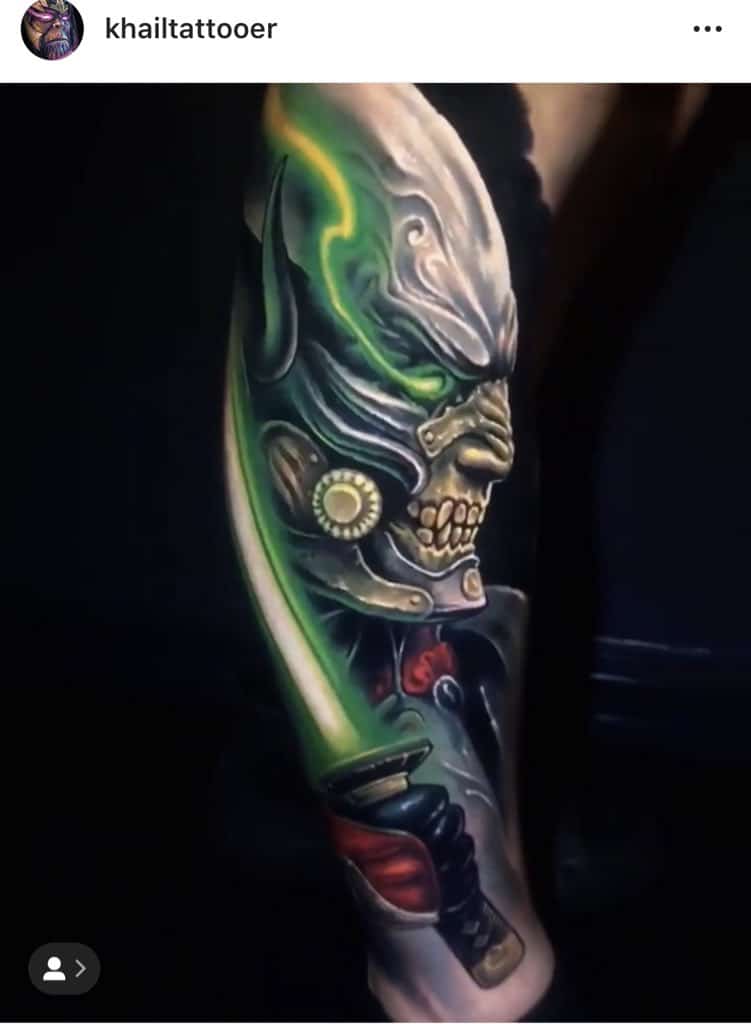
Photo credit: X.com
Yoshimitsu appeared in the first Tekken game and has appeared in everyone ever since.
Yoshimitsu is both a ninja and the leader of the Manji Clan, a Robin-Hood-type group that steals from people who profit from dishonest activities so that they can redistribute this wealth to the poor.
Yoshimitsu entered the first King of Iron Fist Tournament to act as a decoy while his subordinates stole the event’s operating funds
Where To Put Your Japanese Mask Tattoo?
Japanese Mask Tattoo on Back
The back provides a spacious, relatively smooth area that perfectly accommodates large and intricate designs like a Japanese mask.
This gives the tattoo artist ample room to work with, allowing for greater detail and visual impact.
Tattoos on the back are easily concealed by clothing, making them suitable for those who want a discreet option or need to adhere to dress codes in professional settings.
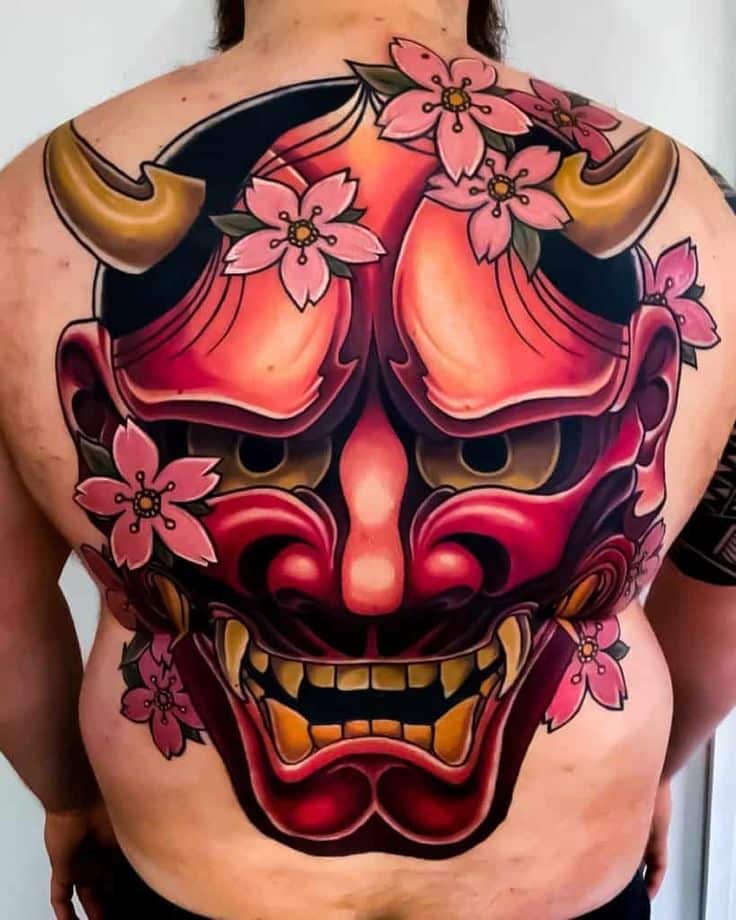
Photo credit: Pinterest
This Oni tattoo on the back is captivating, with the Oni's intense gaze seeming to pierce through to onlookers, symbolizing a protective aura around the wearer.
This placement not only highlights the Oni's formidable presence but also suggests a companionship in facing adversities, with the Oni warding off negativity and guiding the wearer forward.
Japanese Mask Tattoo on Chest
The chest is the central point of the body, drawing attention and emphasizing the significance of the tattoo, so a Japanese mask placed on the chest takes center stage, showcasing its symbolism and power.
A Japanese Mask Tattoo on the chest is often readily visible, especially during warmer weather or with open shirts.
A Japanese mask on the chest commands attention and can serve as a powerful statement piece or a source of personal inspiration.
The chest tattoos can accommodate designs of varying sizes. A smaller, more detailed Japanese mask can be a powerful focal point, while a larger, more elaborate design can create a striking visual impact.
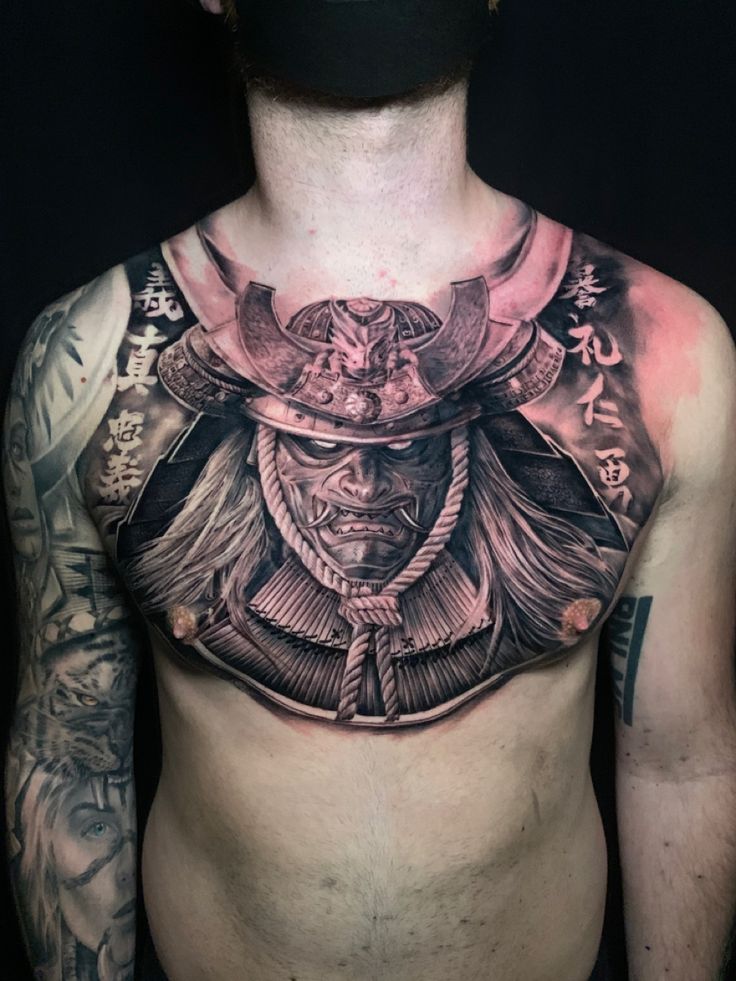
Photo credit: Pinterest
The Samurai mask tattoo spanning the chest creates a striking and meaningful statement.
Positioned front and center, it not only showcases the intricate details of the design but also symbolizes the wearer's inner strength and courage, embodying the spirit of facing life's challenges head-on.
Shoulder Japanese Mask Tattoo Ideas
The shoulder's rounded shape offers a unique canvas that makes tattoos flow beautifully. A Japanese mask can wrap gracefully around the curve of the shoulder, enhancing its dimensional appearance.
Like the back, shoulder tattoos can be easily revealed or concealed depending on clothing choices. This allows for personal expression without sacrificing discretion if desired.
The shoulder is traditionally associated with carrying burdens and responsibilities.
A Japanese mask, whether representing a guardian spirit or personal strength, can reinforce this symbolism.
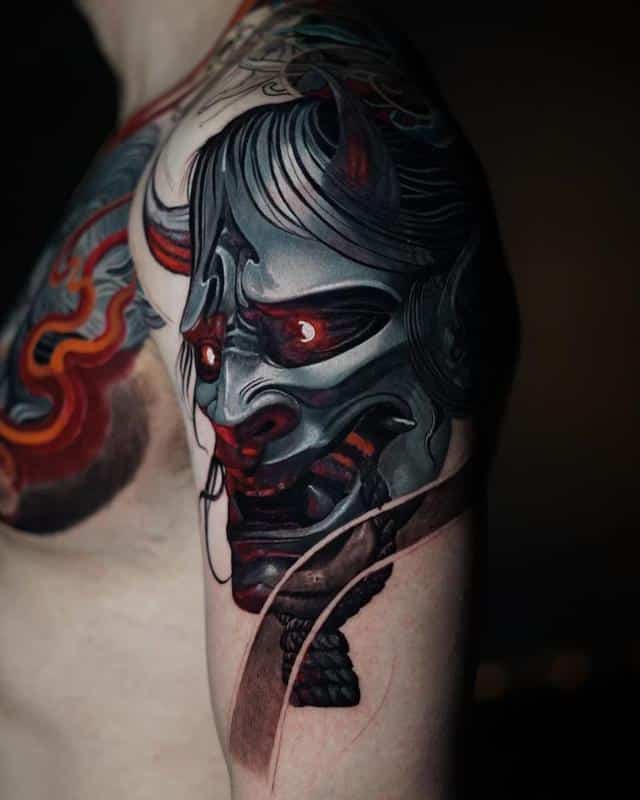
Photo credit: Georgiana Boothby
This Hannya mask tattoo on the arm is a testament to the artistry of Japanese mask tattoos.
The bold colors and meticulous detail are breathtaking, and the deep red creates a stunning visual contrast that emphasizes the mask's intensity.
Japanese Mask Tattoo on Leg
The leg, particularly the thigh and calf, provide ample space for elaborate designs.
This allows for incredibly detailed renderings of Japanese masks or larger compositions incorporating them with other Japanese imagery.
The leg's natural lines and contours create a dynamic flow for tattoos. A Japanese mask can be designed to wrap around the calf, following the curve of the muscle for a powerful and eye-catching effect.
The leg is ideal for a full or half-sleeve leg tattoo. A Japanese mask can become the centerpiece of a larger work, seamlessly integrated with other elements like dragons, koi fish, or cherry blossoms for a full Japanese-themed design.
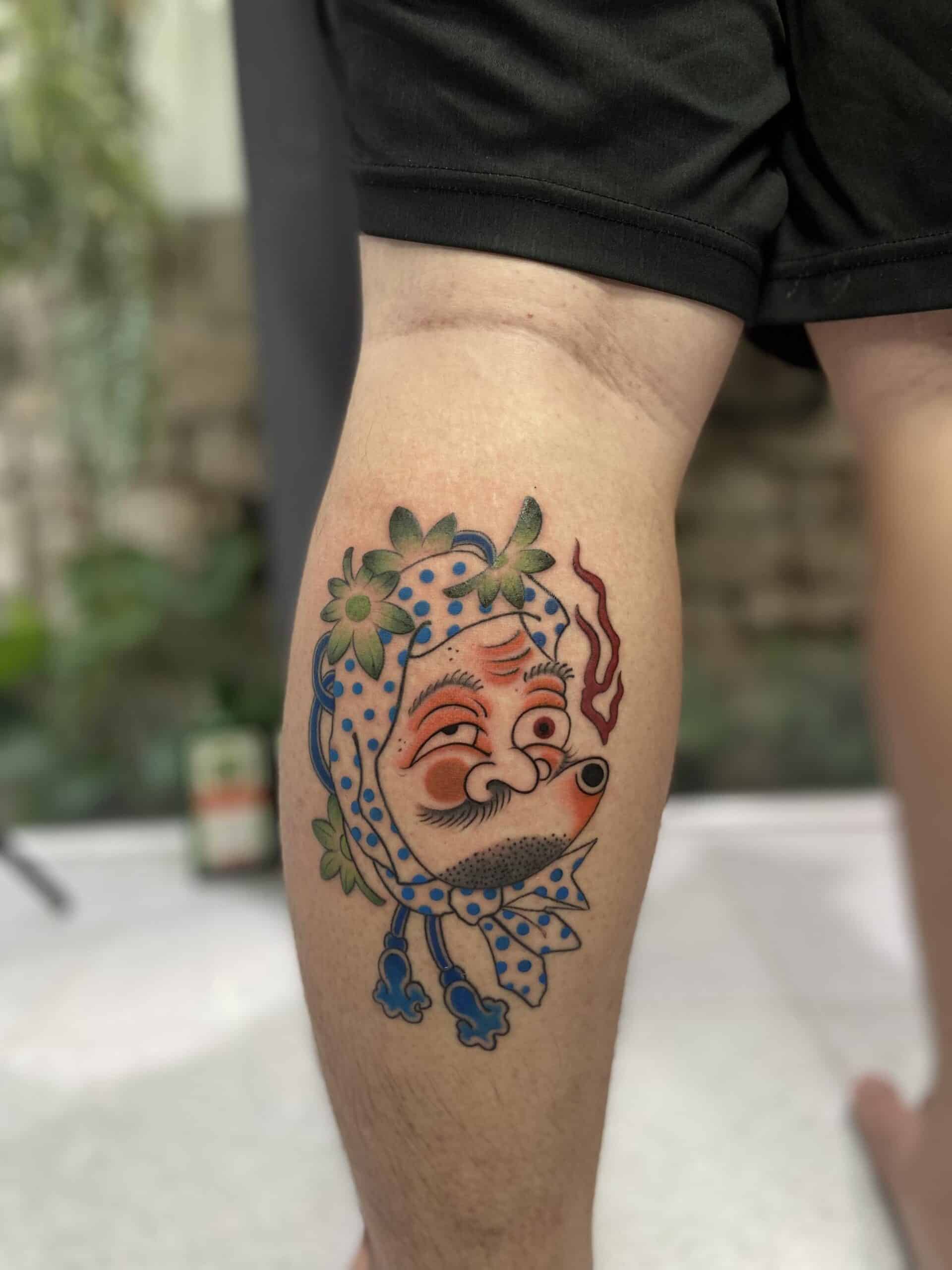
Photo credit: Reddit
A Japanese mask tattoo on the leg or calf allows for expansive, detailed artwork – a perfect fit for those passionate about Japanese culture.
This Hyottoko mask on the leg is simple yet beautiful, with vibrant colors and nice details. It likely reflects the wearer's love of Japan and perhaps their own lighthearted personality.
Beautify Your Hand With Japanese Mask Tattoo Designs
Hand tattoos are inescapably visible, making them a statement of personal expression.
A Japanese tattoo on the hand demonstrates a fearless commitment to the chosen design and its symbolism.
The relatively small canvas of the hand forces a focus on impactful imagery. Traditional Japanese motifs like koi fish, dragons, or masks demand detailed work, which can result in a stunning piece despite the small scale.
The hand offers a bold and attention-grabbing canvas for Japanese tattoos.
While it might not be for everyone, for those who embrace the visibility and symbolism, it can be a powerful way to showcase their appreciation for Japanese artistry and culture.
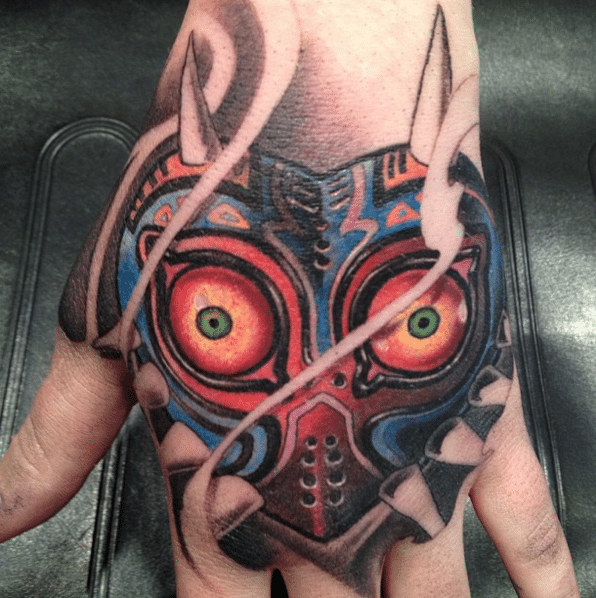
Photo credit: Pinterest
This hand tattoo of Majora’s Mask from The Legend of Zelda Majora’s Mask shows how the hand is a brilliant location for your Japanese mask tattoo.
While Majora’s Mask was inspired by the Marajoara tribe of Brazil, Majora’s Mask is still unmistakably synonymous with Japan.
This tattoo captures the spooky essence of Majora’s Mask, showing its incredible iconic design and its beautiful colors and allowing the wearer to show his love for the acclaimed video game.
Conclusion
As tattoos continue to evolve as an art form, the inclusion of motifs from diverse cultures, including those inspired by Japanese masks, highlights the universal desire for connection, expression, and the human experience.
In this light, one does not need to have direct cultural ties or extensive knowledge to appreciate or adopt these designs.
What matters most is the personal significance, the story each tattoo tells, and the way it reflects the wearer's journey, values, and aesthetic preferences.
Whether drawn to the traditional allure of the Noh theatre, the whimsical charm of the Hyottoko, or the dynamic heroes and villains of contemporary media, there is a Japanese mask tattoo out there that can encapsulate the essence of what you wish to express.
Just like the Oni can ward off Evil and offer protection, proper tattoo aftercare can ward off pain and discomfort.
If you’re looking to get a Japanese Mask Tattoo of your own, then it's vital you check out these tattoo aftercare products to banish your pain and get you back into the action as soon as possible.
FAQs of Best Japanese Mask Tattoo Ideas
What Sets Oni Masks Apart From Hannya Masks?
While both Oni and Hannya masks are iconic in Japanese culture, they represent different concepts. Oni masks depict male demons or ogres and often symbolize external threats or malevolence.
In contrast, Hannya masks portray a specific type of female demon, one that embodies the complexities and darker aspects of feminine emotions and jealousy.
Is It Considered Disrespectful To Have An Oni Mask Tattoo?
For the younger generation, typically under 40, an Oni mask tattoo isn't seen as disrespectful and might even be regarded as trendy or cool. However, it's worth noting that more traditional or older individuals might not view it as favorably.
Additionally, be mindful that having a tattoo, regardless of its design, might restrict your access to public baths or Onsen in Japan due to prevailing social norms.
Do Hannya Masks Represent Evil?
The Hannya mask, with its horned forehead, piercing golden eyes, and a mix of rage and despair on its face, might give off a demonic vibe.
However, its significance is more nuanced, encapsulating the depth of human emotions and the tragedy of transformed love, making it not just a symbol of malevolence but also of sorrow and complexity.
Can I Get A Japanese-style Tattoo Even If I'm Not Japanese?
Absolutely, there's no cultural barrier to appreciating and opting for a Japanese-style tattoo, including those inspired by traditional masks.
This art form is globally recognized and appreciated, and choosing such tattoos is generally not considered offensive, regardless of your heritage. It's always good practice, however, to understand and respect the meanings behind these traditional designs.
- Fish Tattoos - July 25, 2024
- Bearded Dragon Tattoo - July 23, 2024
- Video Game Tattoo Ideas - July 19, 2024
